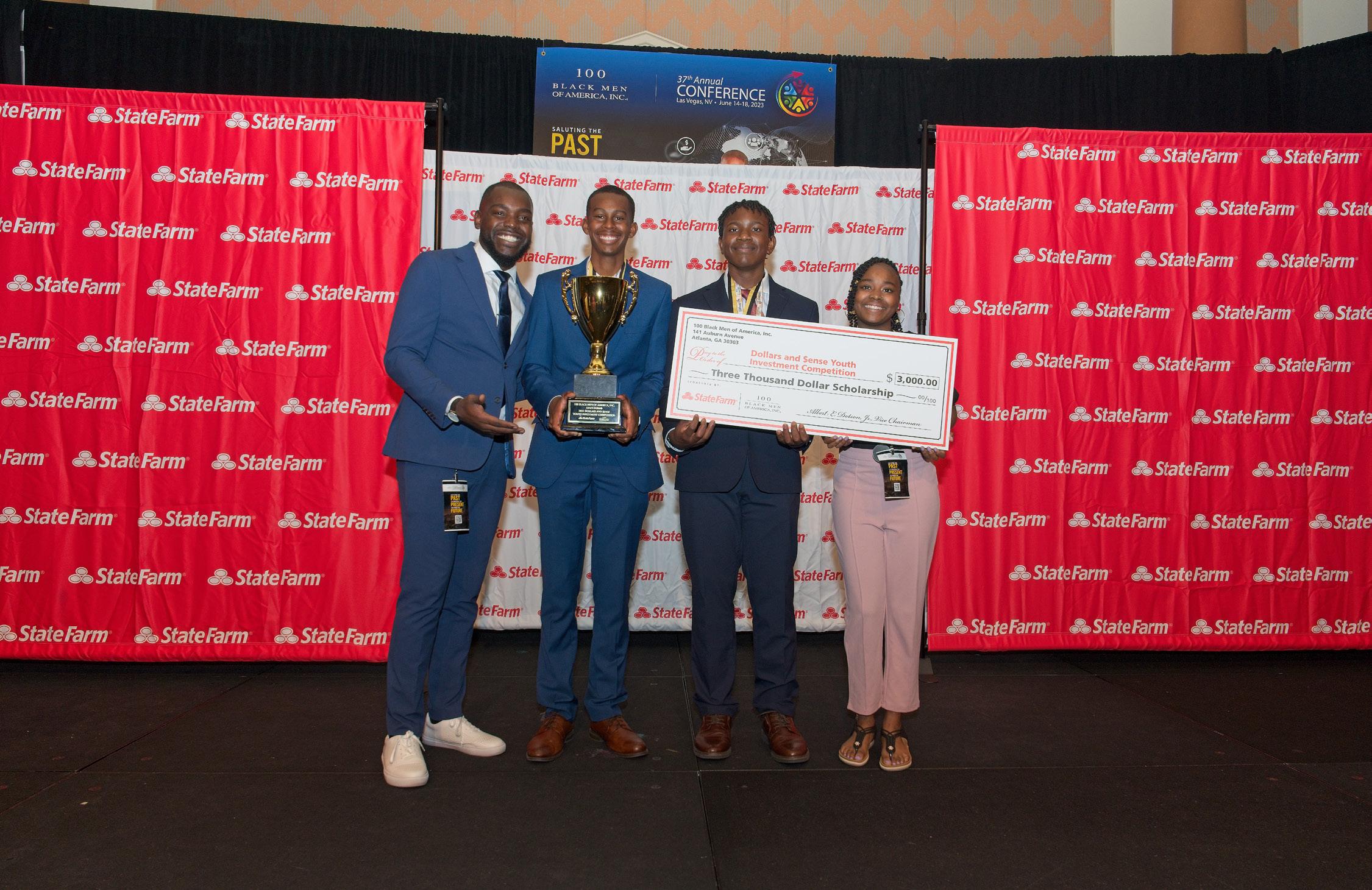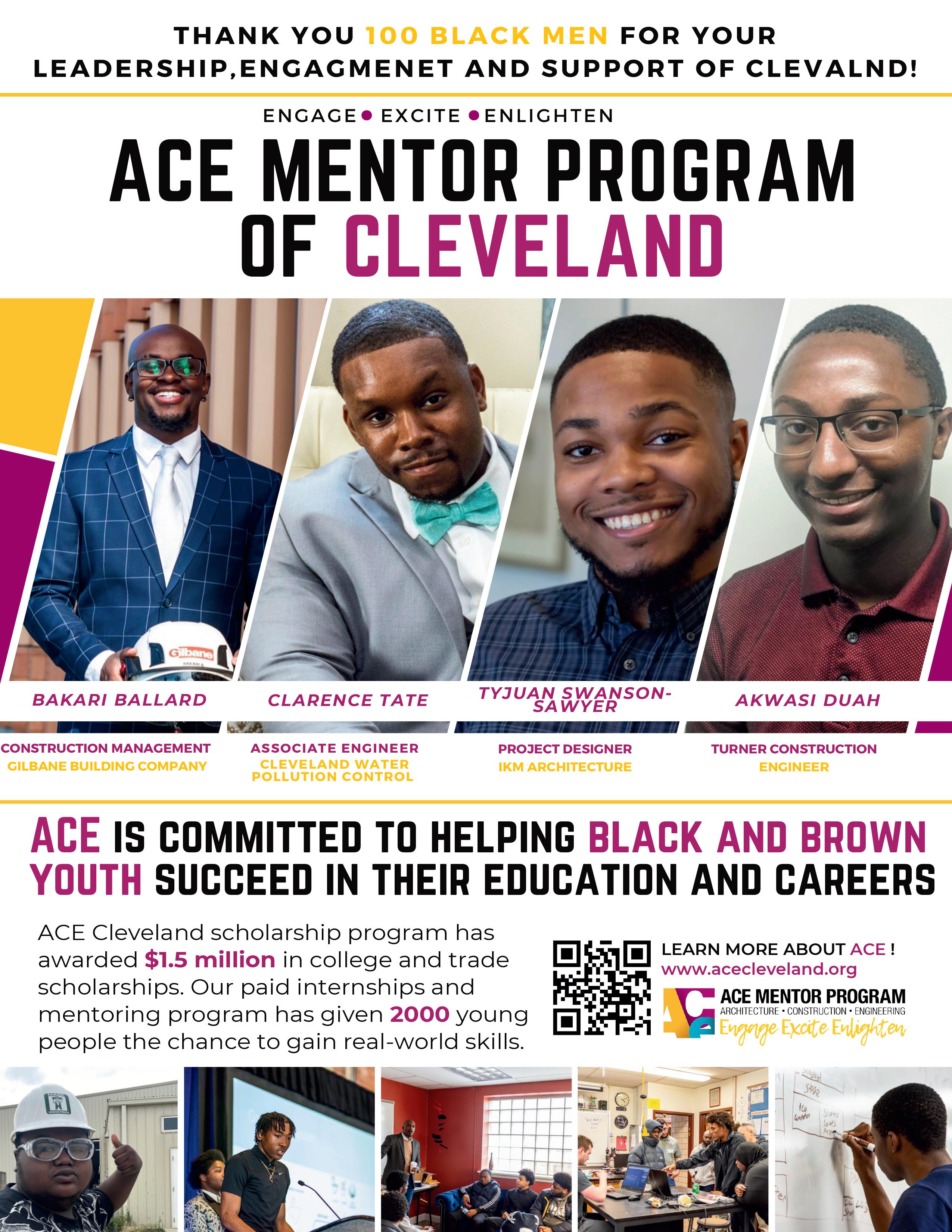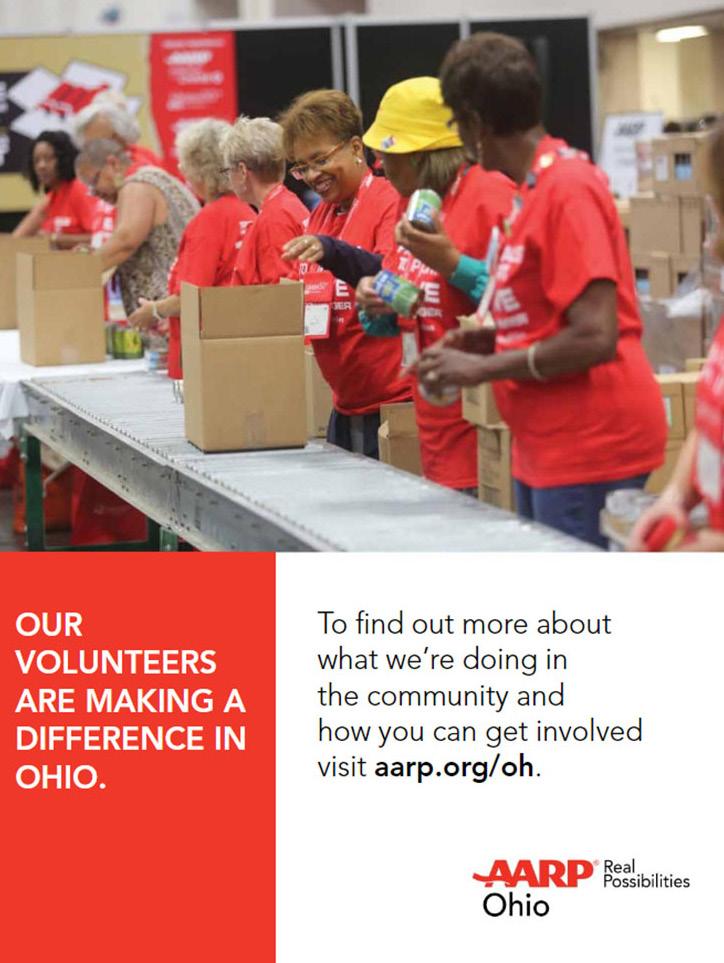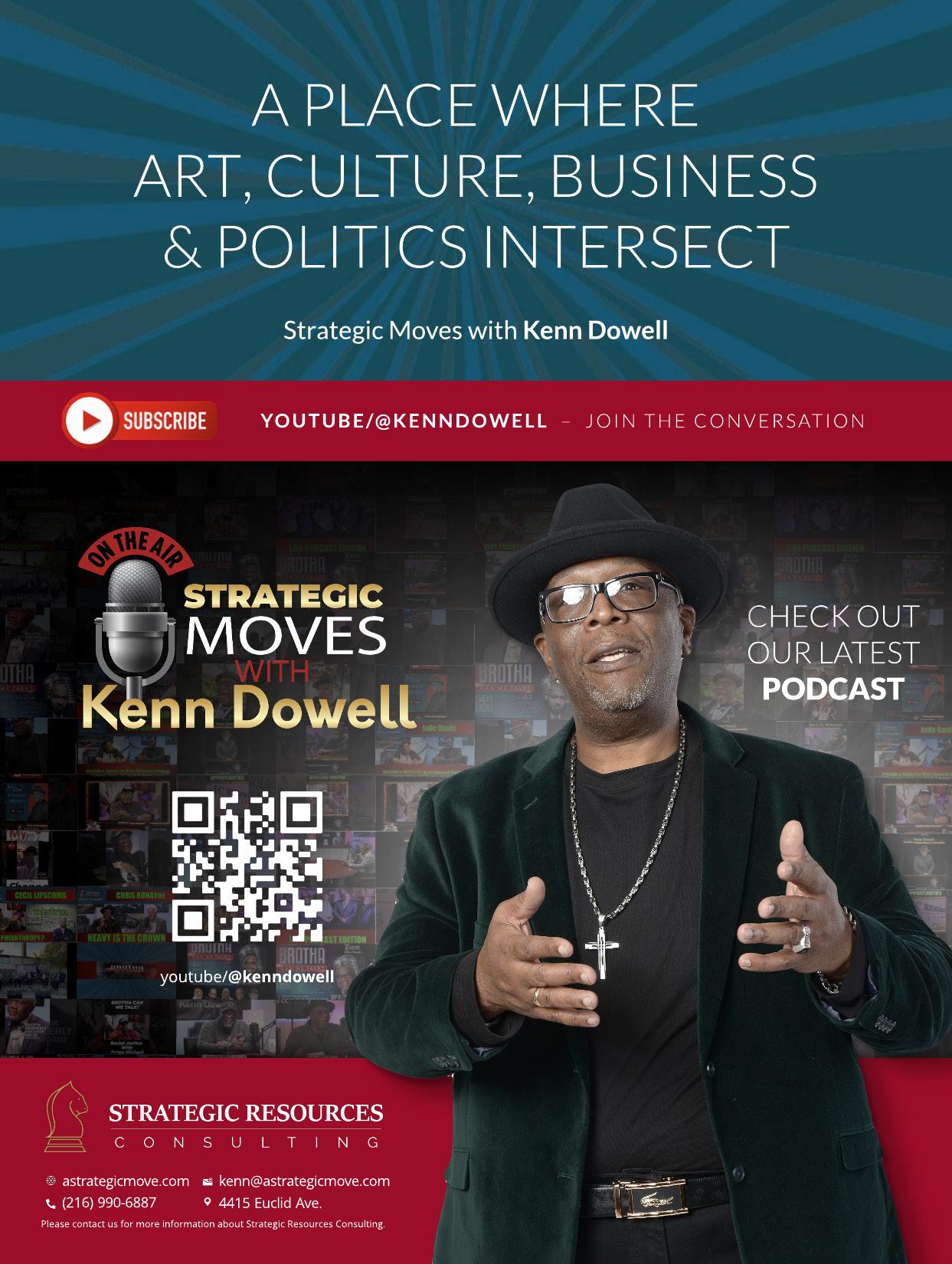








We embrace diversity, equity, and inclusion and believe every person deserves to feel respected, supported, and valued.















We embrace diversity, equity, and inclusion and believe every person deserves to feel respected, supported, and valued.





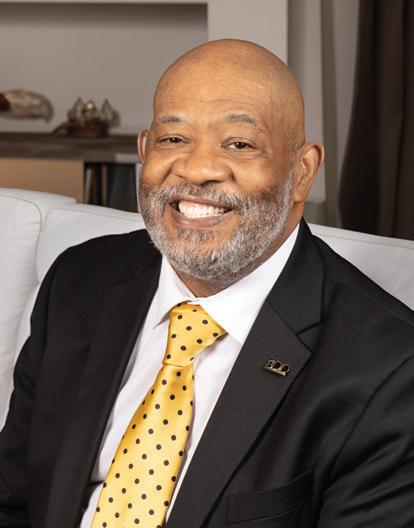
Greetings, everyone. This month, we will provide information about finance, taxes in the Real Men Magazine. In the United States, Tax Day is when individuals income tax returns are due to be submitted to the federal government. Since 1955, Tax Day has typically fallen on or after April 15. Tax Day was first introduced in 1913 when the Sixteenth Amendment was ratified. March is also Women’s History Month, an annual declared month highlighting women’s events’ contributions to history and contemporary society. I respect the accomplishments many women have made in history.
In today’s economy, it’s essential to cut costs and pay your taxes, but eliminating some things, such as insurance, is not wise. One of our excellent members serves in many facets of this organization on the cover this month and works in the tax area. This issue will also feature stories about various financial stories. The 100 Black Men of Greater Cleveland, Inc. is built on hard work, including Economic Empowerment, Health & Wellness, Education, and mentoring.
On behalf of our team, we want to say THANK YOU. Every day, we are amazed by our community, which uses innovation, ideas, and service to impact the local and global levels. We are inspired. Every time we read and edit a story, we’re empowered and comforted by the fact that there are people out there fulfilling their missions to turn a problematic story into a good story.
Be on the lookout for our Saturday Academy, which is returning to help prepare our youth for the future.
 James W. Wade III Managing Editor
James W. Wade III Managing Editor


Robert Bankston
Brandon Curry Robert Dix Jr.
Christopher Howse




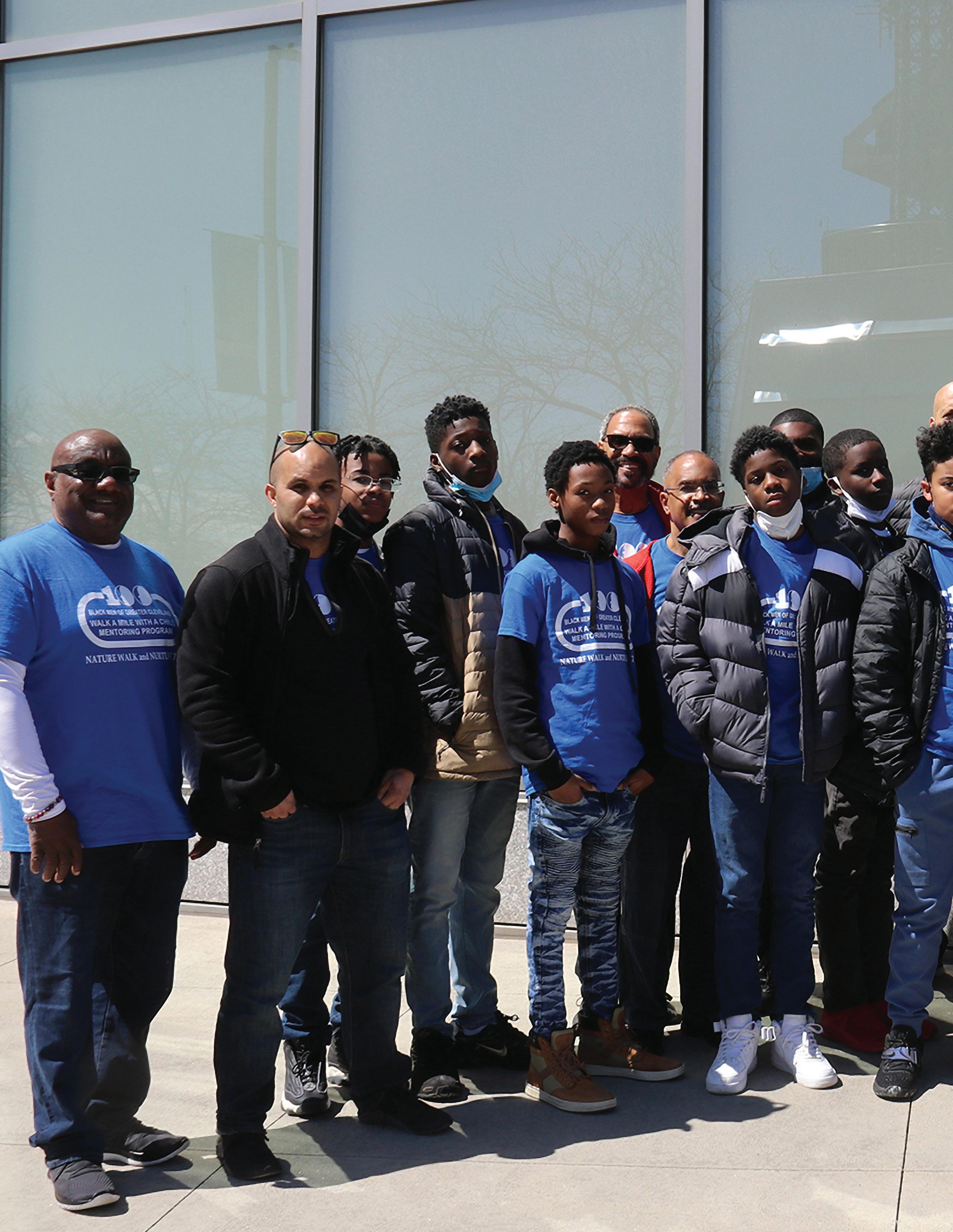
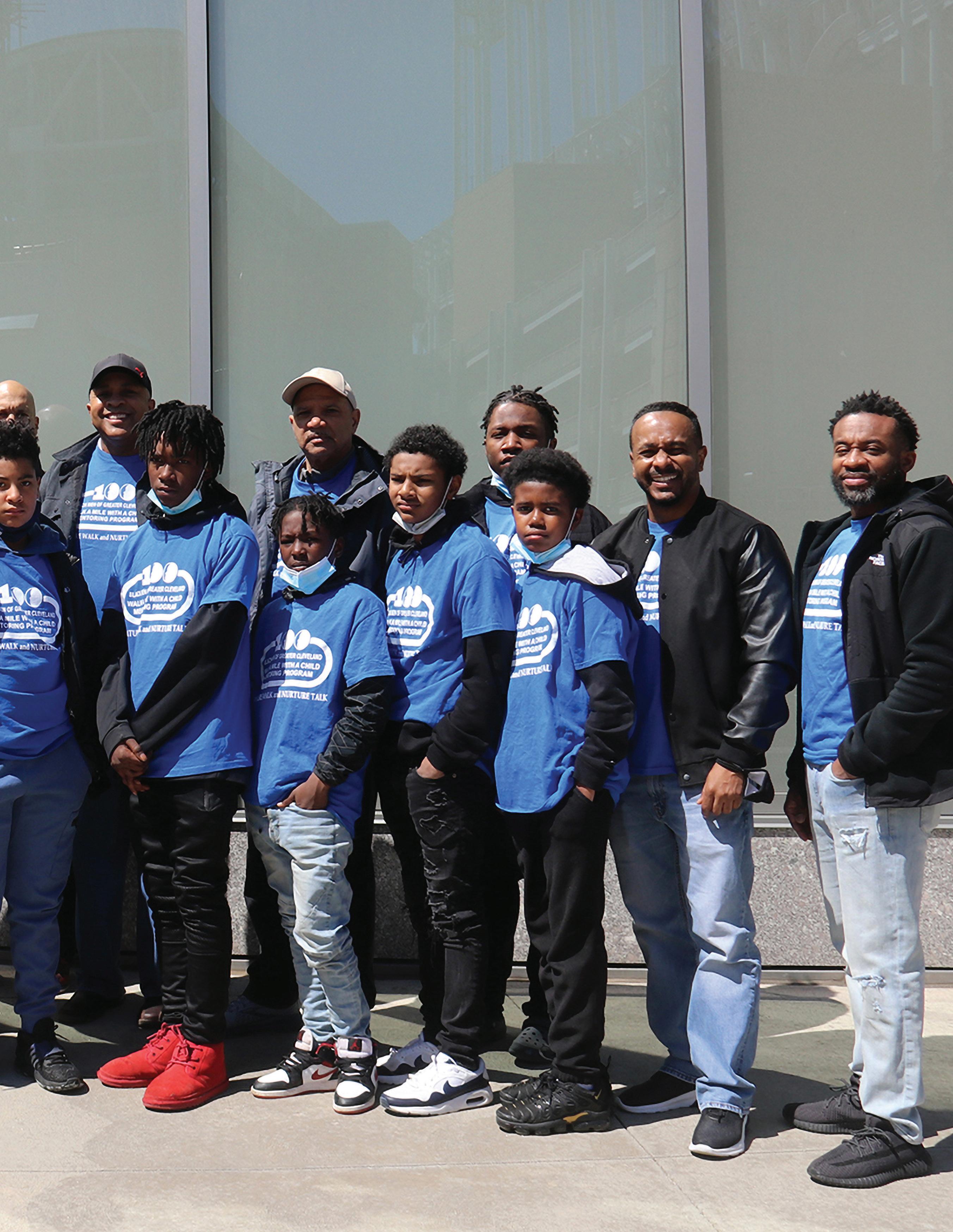
The 100 Black Men of America, Inc. is recognized as the nation’s top African American led mentoring organization. Every African-American person should have the ability to create the life they’ve always wanted and that’s what The 100 Black Men of America, Inc. provides.
Committing ourselves to personify the type of people our children will look up to and emulate, we embrace the immense responsibility we have to our mentees and our communities. Providing these children another choice in life by being around likeminded individuals who have similar aspirations and goals.
As we have grown The Network of 100 Black Men of America, Inc. more companies and programs have been formed to assist in delivering the education and empowerment needed to change the course of these children’s lives. This is done through the 100’s Four For The Future focus areas; Mentoring, Education, Health & Wellness, and Economic Empowerment.
Through the expansion, we’ve created 100 Black Men Chapters that delivers unique programs that address specific needs in local communities. Through 57 years of testing, we’ve created the 100’s successful model. A proven blueprint for mentoring and developing young people into future leaders by surrounding themselves with a positive network and giving them the opportunity that they may not have thought was possible.
Our ongoing commitment to continuously improve and implement our programmatic initiatives is what drives us. Helping shape our mentees realize their potential by showing them how to be successful and significant, stressing the importance of obtaining and applying education, and providing them the tools that empower them for selfsufficiency, cultivated civic, and business leadership
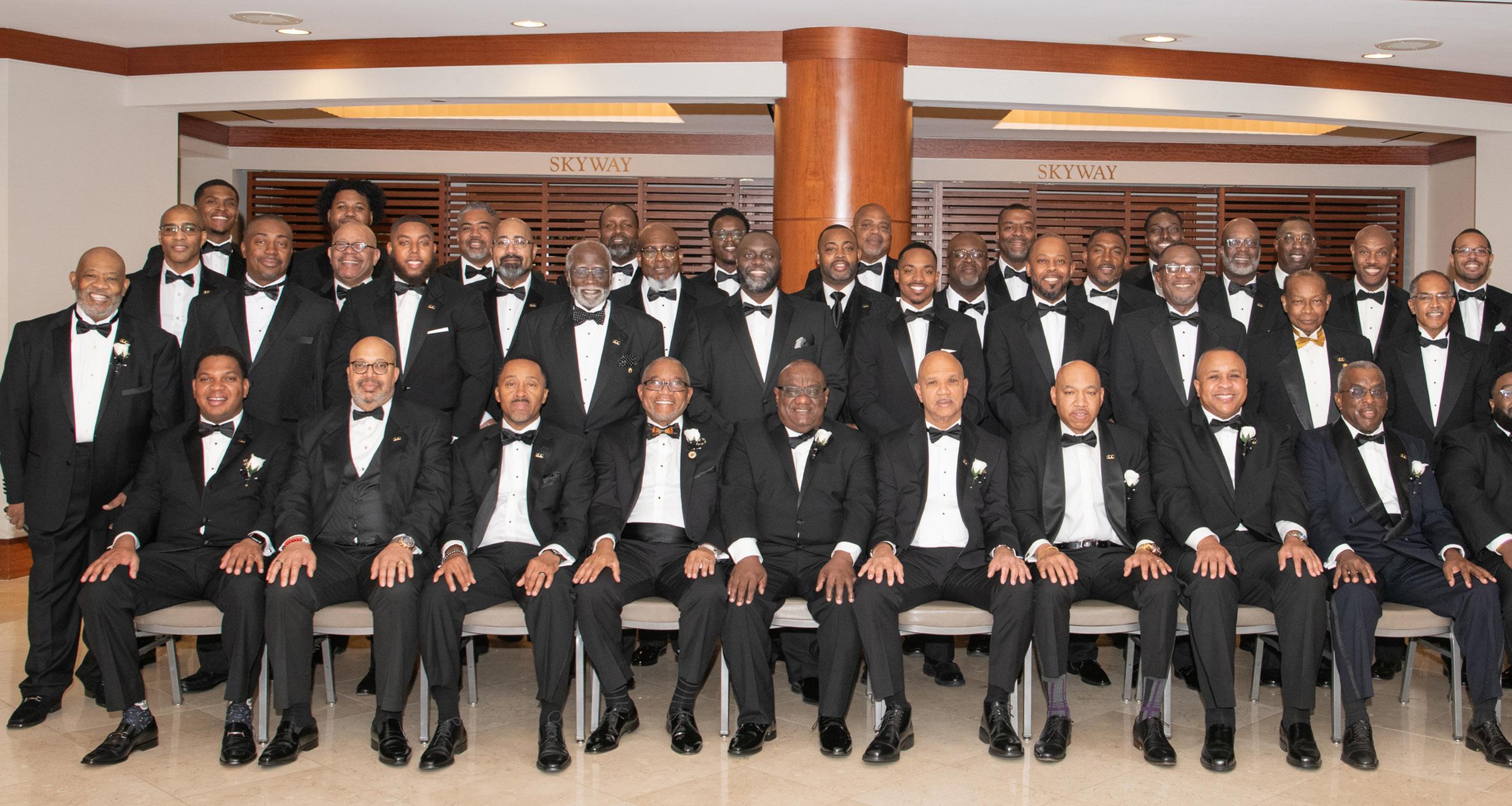
The history of the 100 Black Men of Greater Cleveland began when several men traveled to Atlanta, Georgia, at the invite of the late Roosevelt Adams. Roosevelt was a Clevelander who moved to Atlanta and became a successful businessman. He was also a member of the Metro Atlanta Chapter of the 100BMOA, arguably the most powerful chapter of the 100 in the country.
The 100 had been trying to establish a chapter in Cleveland for years but had yet to succeed. Roosevelt introduced Michael Nelson to Thomas W. Dortch, the National Chairman of the 100 Black Men of America and a very prominent businessperson in his own right. Thomas and Roosevelt explained to Nelson that they had met with some Cleveland Black businessmen and community leaders about starting a chapter of the 100. Nelson knew many of the names they mentioned and even indicated that he had attended at least two attempts to organize a Cleveland chapter.
At this point, Nelson promised both men that he would get the ball rolling in Cleveland and have a chapter in place. Nelson concluded that he would hold an organizational meeting of individuals who fit into each category, including representatives from the powerful political factions, Congressman Louis Stokes, former City Council President George Forbes, and Mayor Michael R. White.
A date was set, and Nelson invited a number of his friends, including Larry Hines, Gregory Clifford, Curtis Griggs, Tony Smith, Luther Towers, and Julius Singleton, along with Stokes’ rep, Ron
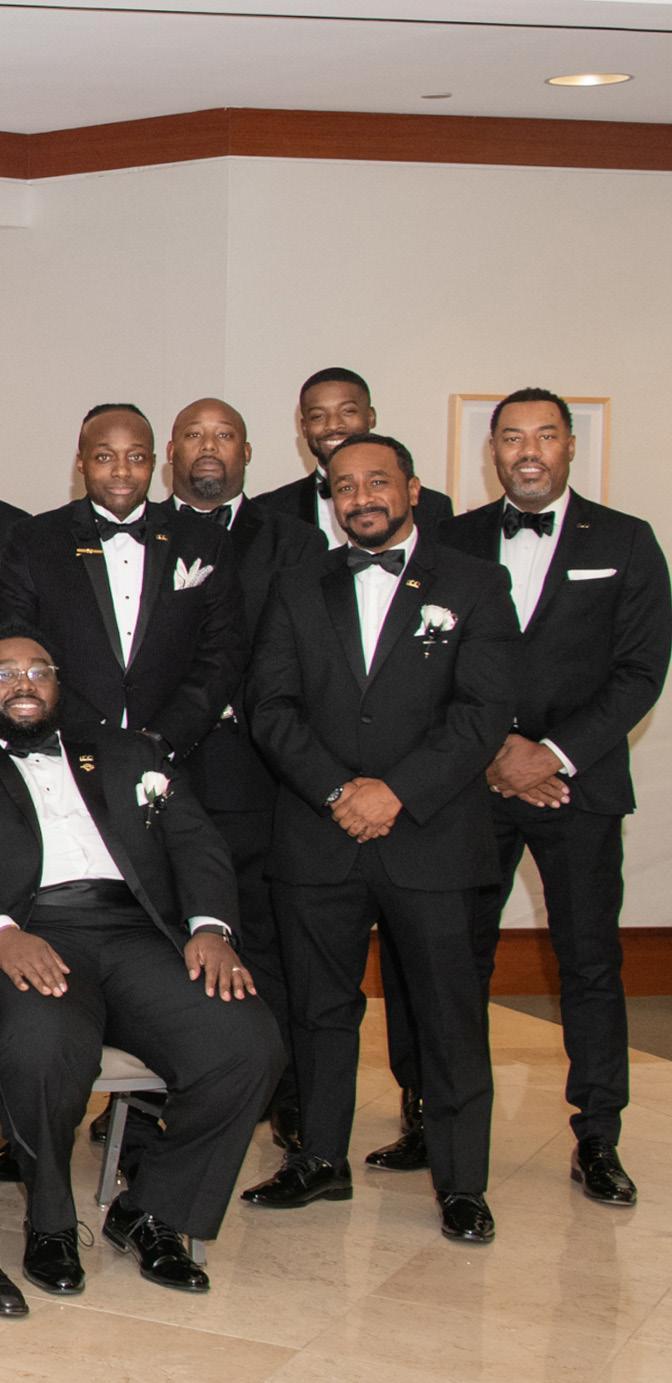

Adrine, Forbes’ rep, Daryl Fields, and White rep, Nate Gray to meet with Chairman Dortch and Roosevelt Adams. The meeting was held at the nowclosed Eloise’s Restaurant on East 79th and Carnegie. The Cleveland Chapter was established in 1997 and became an entire fledge chapter.
The first significant event was a rollout at the Cleveland Clinic. Over 90 men committed to joining, with about 70 men paying dues. Mayor Michael R. White committed to buying 100 copies of nationally known motivational speaker George Frazer’s book Success Runs in Our Race for each member. George, who attended the opening event, graciously took the time to autograph each member’s copy.
The next major event was a fundraising gala featuring nationally known recording artist the late Phylis Hyman. The event coordinator was the dynamic Richard Johnson, considered a significant internet influencer in today’s social media world. The event was held at the Marriott Hotel in Cleveland, and to say it was a success would be an understatement.
Funds raised by that first gala supported the Cleveland chapter’s version of the National 100’s Four For The Future programs of Health/Wellness, Economic Development, Education, and Mentoring. Larry Hines was our first Program Director, assisted by Curtis (Griggs)…. the parentheses are intentional; that’s how Curtis spelled his last name.
The 100 would continue to grow its brand in Cleveland. The group coordinated mentoring programs in numerous schools, including Daniel E. Morgan Elementary School, Cleveland East Senior High School, John F. Kennedy Senior High School, East Cleveland Shaw Senior High School, Mound School, and Warrensville Heights Senior High School. The 100 also held a Saturday morning mentoring program at its offices in Cleveland’s Shaker Square complex. The numerous programs included a reading program at Daniel E Morgan and a stock market competition at East High School. One of the highlights of our plan was the success of our East High Stock Market Challenge team, which traveled to Atlanta and took on some of the nation’s most prominent schools, finishing a highly respectable 3rd out of the scores of schools that competed.
In 2022, a class of 22 new members came in, and in 2023, the chapter is still thriving. Now, in 2024, celebrating twenty-sevenyears,aftersevenchairmenandnumerousgalas,youcanstillfindthemenmentoringinsuchschools as Wade Park Ken,neth Clement Boys Leadership Academy, and The Friendly Inn Settlement, to name a few.
I hope you are a regular reader and supporter of the 100 Black Men of Greater Cleveland, Inc., Real Men Magazine. The magazine is one way to follow what’s happening with the 100! This issue deals with the importance of economic empowerment for the African American community and financial literacy for African American youth.
In today’s society, economic empowerment is more than just a concept; it is a critical tool for advancing social and racial equity. The Black community has historically faced systemic barriers that have hindered economic progress and perpetuated cycles of poverty. These barriers include limited access to quality education, employment opportunities, and financial resources. As a result, many African American individuals and families continue to struggle to build wealth and achieve financial stability. One of the most effective ways to address this issue is through financial literacy education, most notably with the young in our community. By equipping them with the knowledge and skills necessary to make informed financial decisions at an early age, we can empower them to break free from the cycle of poverty and build a brighter future for themselves, their families, and the community.
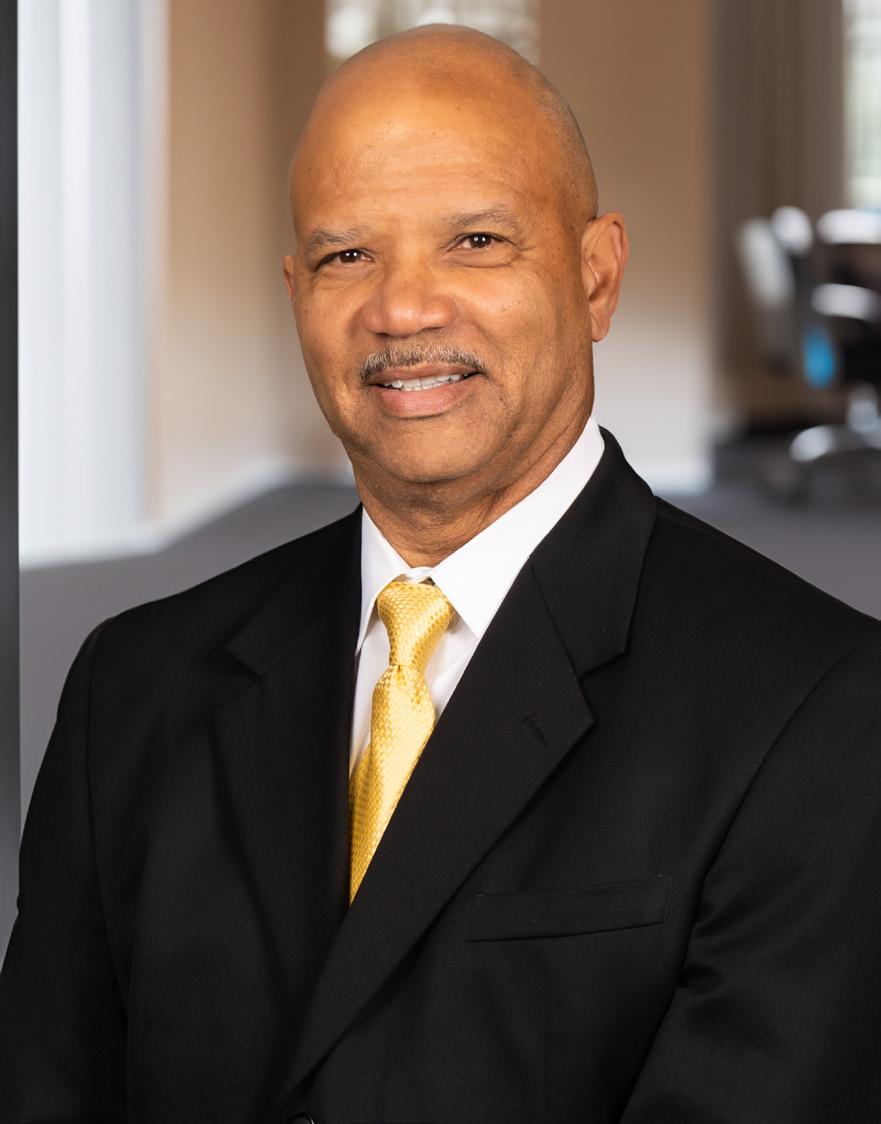
The 100 BMOGC, Inc. understands this very well. Through one of our pillar program categories, Economic Empowerment, we provide financial literacy for our mentees and other youth through workshops, speaker experts, hands-on learning, exposure field trips, and much more. Of course, financial literacy education encompasses a wide range of topics, including budgeting, saving, investing, managing debt, and navigating credit. By teaching these concepts early on, we can help our youth develop healthy financial habits that will serve them well now and throughout their lives. The 100 Black Men of Greater Cleveland, Inc. is committed to promoting economic empowerment and financial literacy through our mentoring programs. Investing in the next generation can create positive change, break down barriers to economic success, and drive meaningful progress toward economic empowerment and financial inclusion for all. I invite you to join us on this mission.
Gregory Lockhart Chairman 100 Black Men of Greater Cleveland, Inc.
Gregory Lockhart Chairman
James W. Wade III Vice Chairman
Robert L. Bankston Secretary
Lucien Blackwell Director of Finance
Grady Burrows Director of Programs
Anthony Peebles Director of Development
Mayor Michael Booker
Grady Burrows
Brandon Curry
Chris Howse
Darian Johnson
Lorenzo Russell Glen Shutmate
James W. Wade III
Director of Communications & Public Relations, James W. Wade III
Economic Empowerment
David L. Taylor - Chair
James Ferguson - Co Chair
Education
Brett Horton - Chair
Health & Wellness
Robert Bankston - Chair
Lloyd Totty - Co Chair
Mentoring
Darian Johnson, Chair
Dr. Ernest Smoot, Co Chair
Membership
National Chairman
Milton H. Jones Jr.
Midwest District Representative
Andre Givens
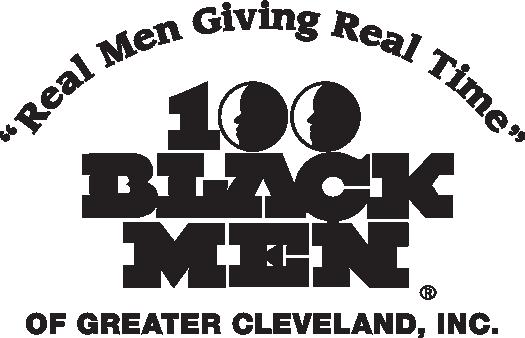
Mayor Michael Booker- Chair
Brandon Curry - Co Chair
Scholarship
Lorenzo Russell - Chair

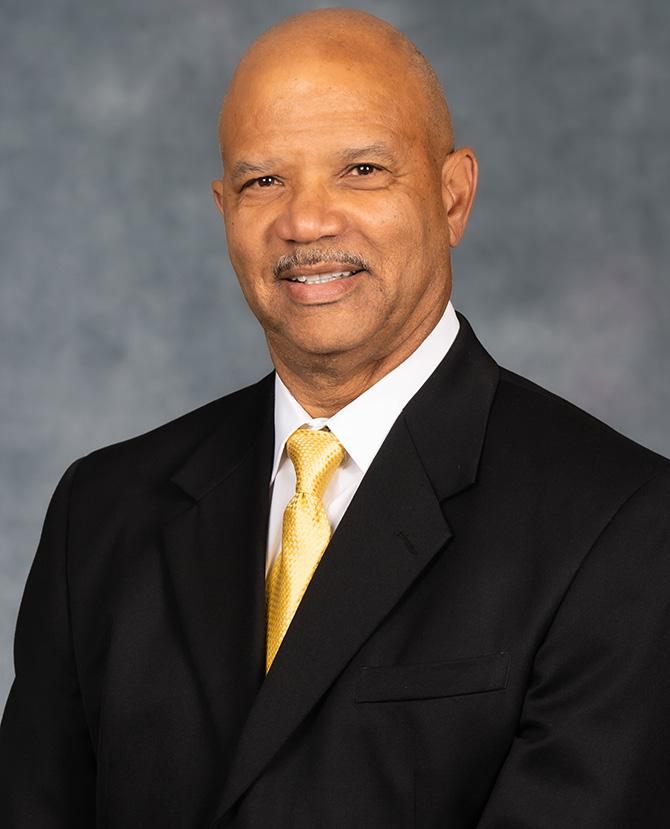
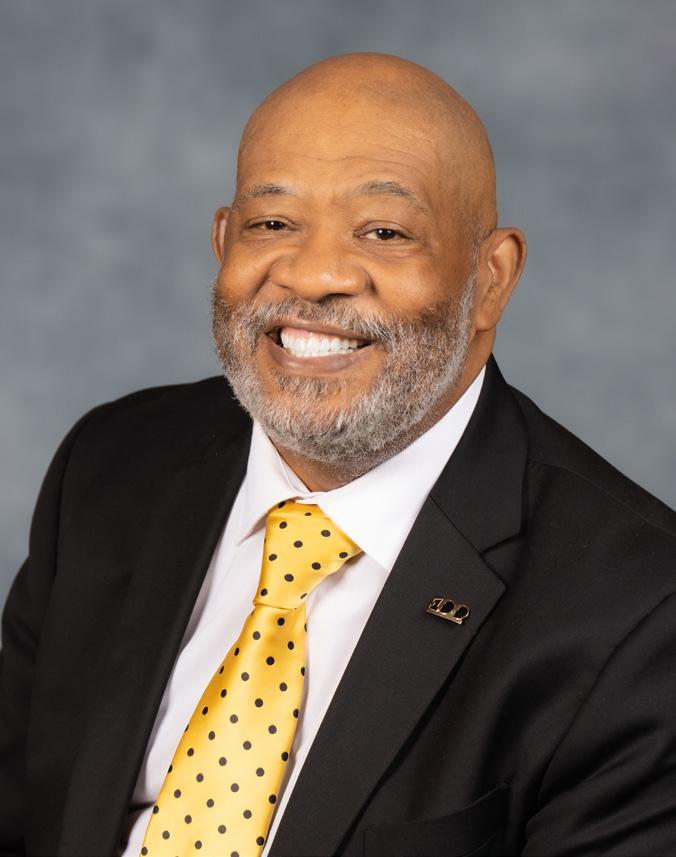
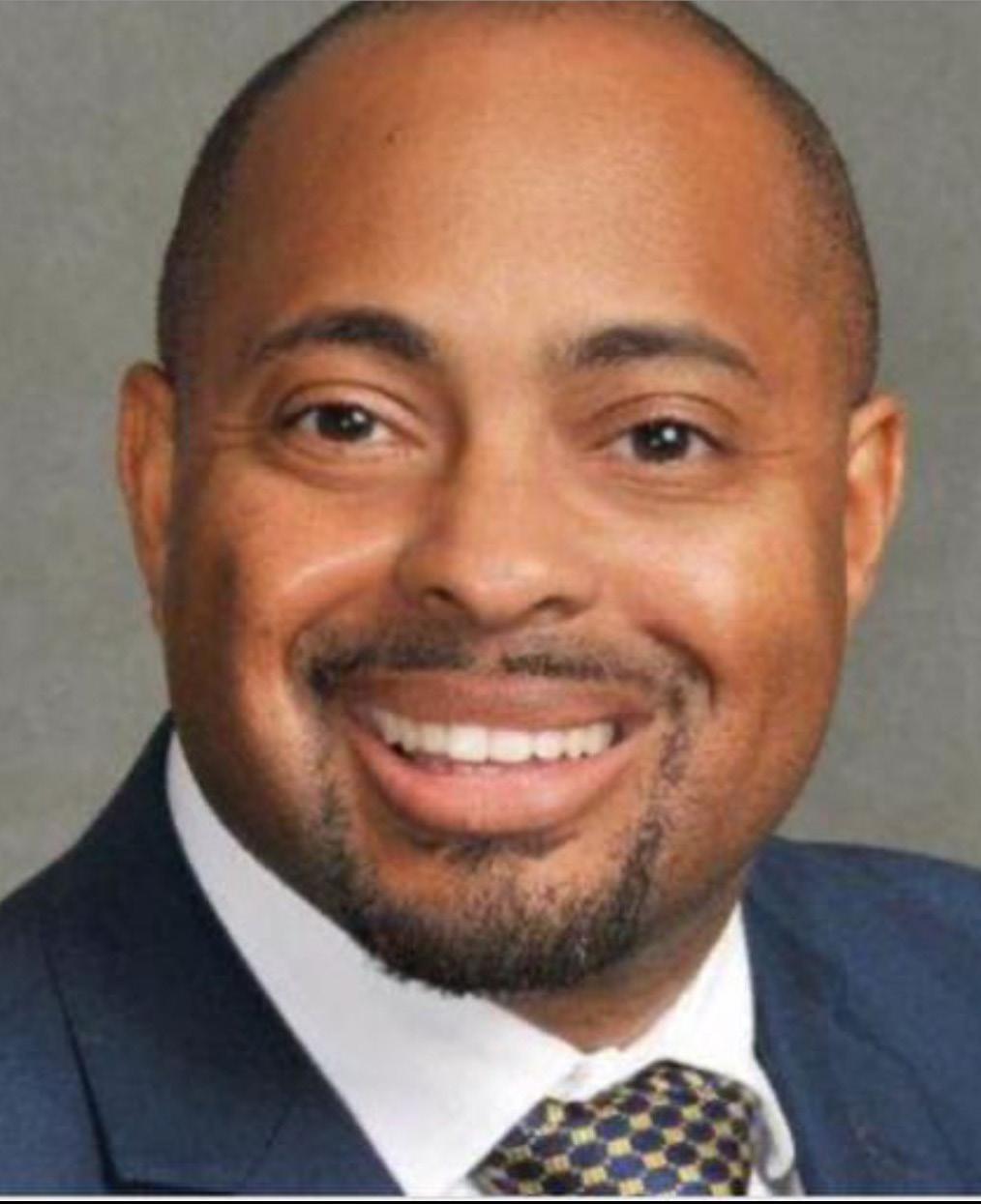
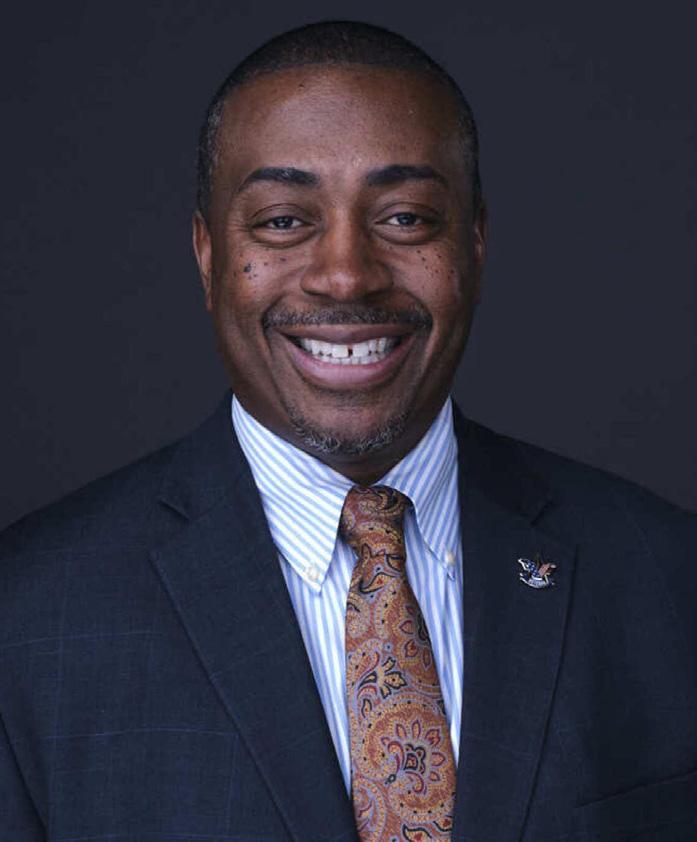
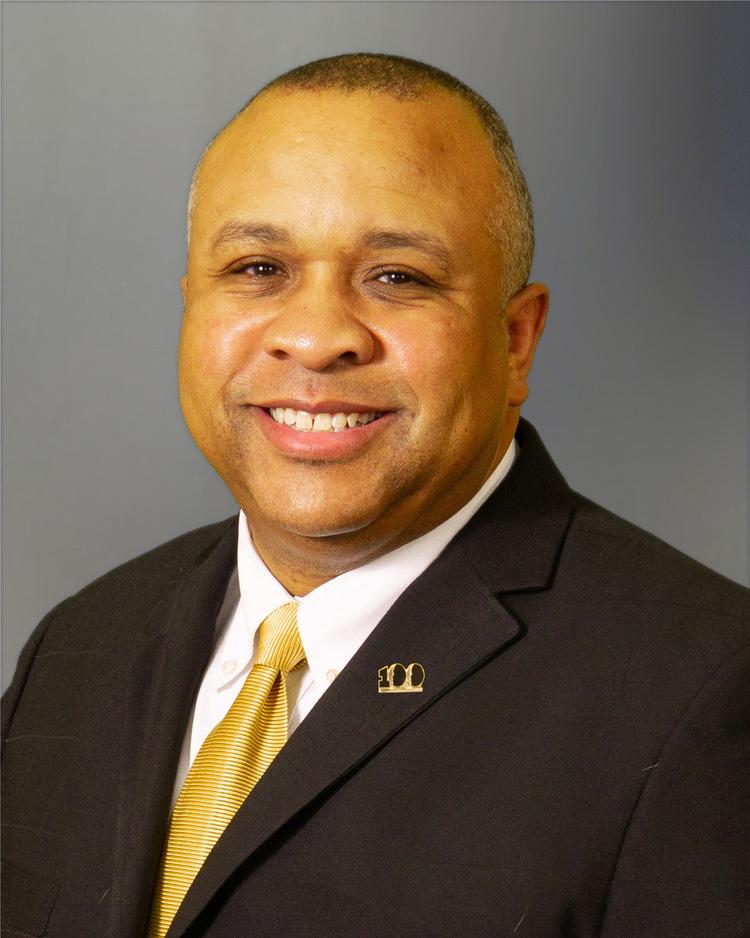
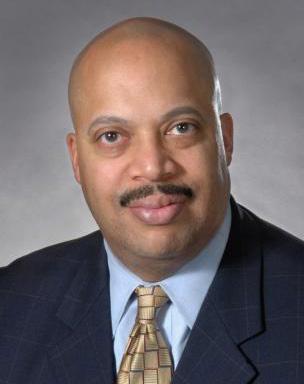

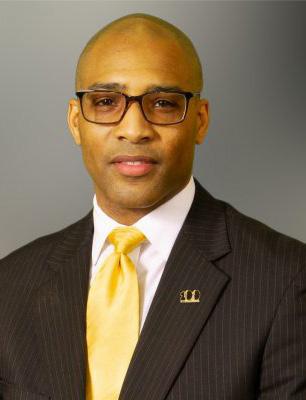
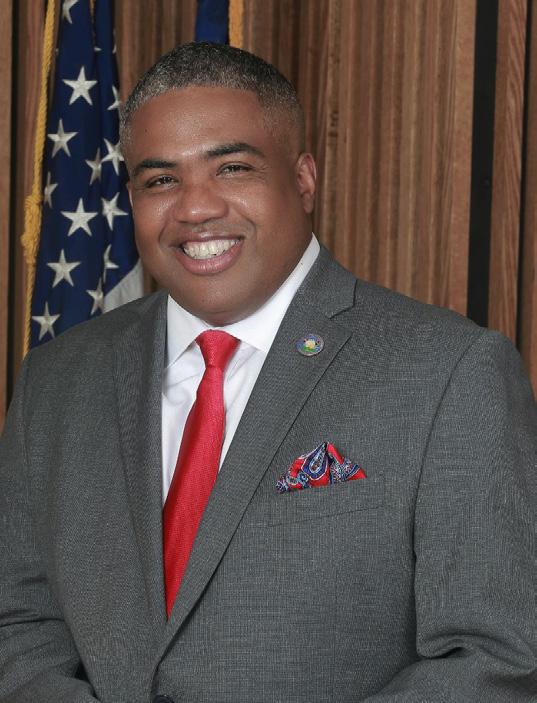
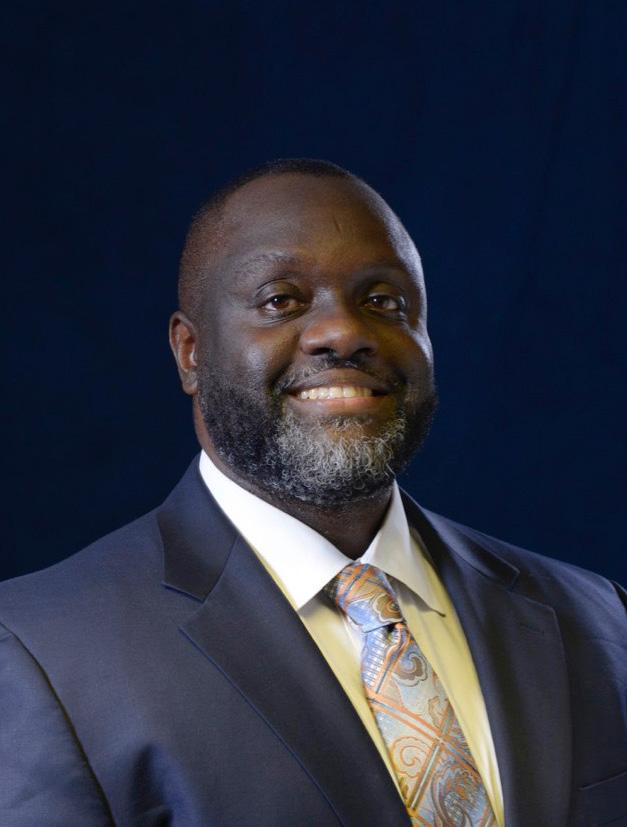
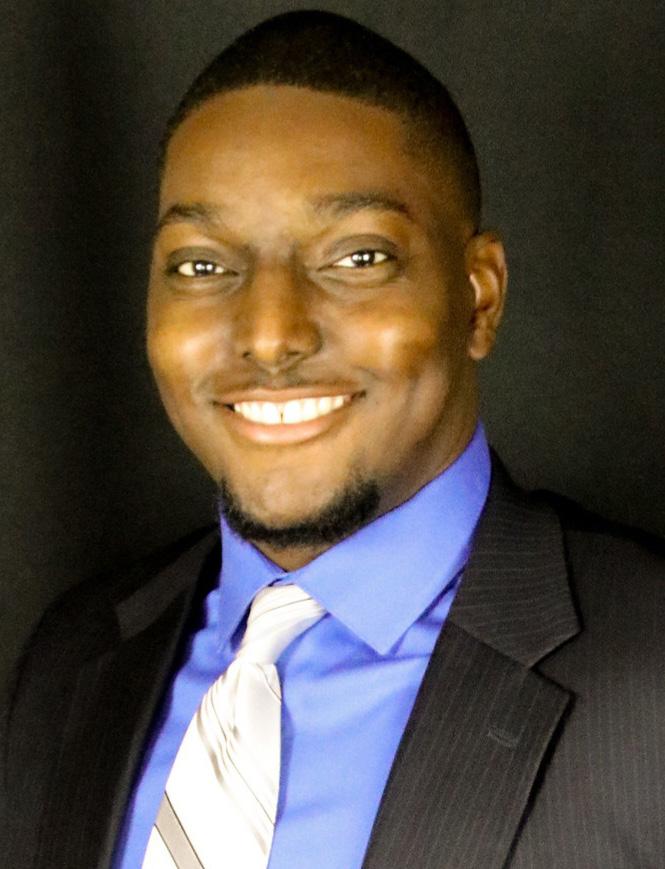
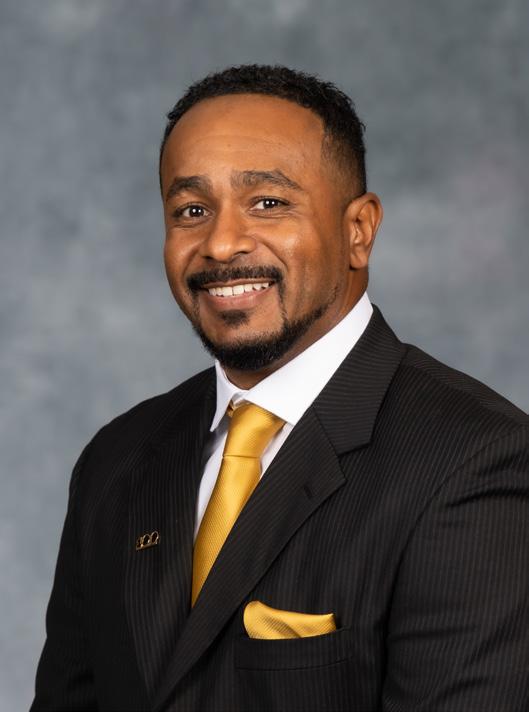
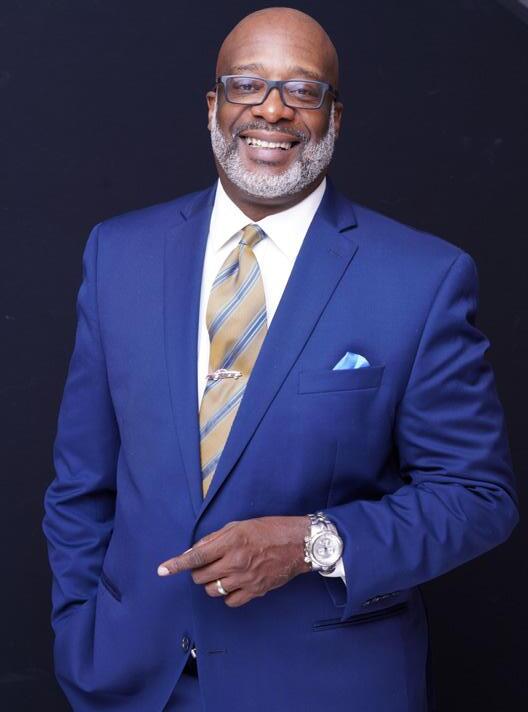
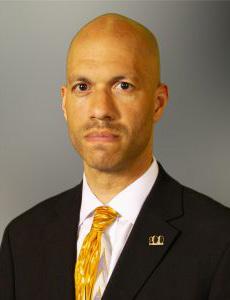
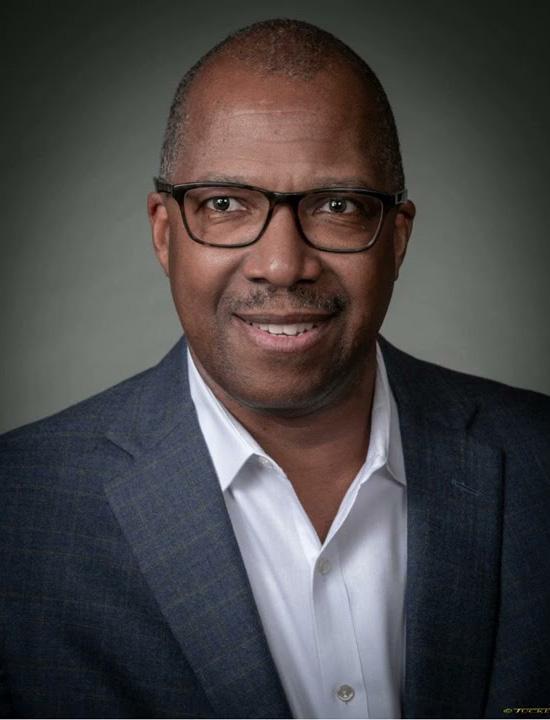

Bilal S. Akram
Greg Alexander***
Robert L. Bankston
Barry Bennet
Lucien Blackwell
Michael Booker
Daniel Brinson
Anthony Brown
Rodney L. Brown
Grady Burrows
Robert Chisholm
Raphael Collins
Michael Copeland
Brandon Curry
Pastor Robert Dix Jr.
Dr. Ronnie Dunn
Aaron Eatman
Travis Everette
James Ferguson
Lee V. Fields Jr.
Duane Griffin
Curtis (Griggs)
Akil Hameed
Jeevon Harris
Erwin Hines
Brett Horton
Judge Ronald Adrine
Honarable Gregory Clifford
Darrell A. Fields
Nate Gray
Curtis (Griggs)
Larry Hines*
Judge Michael Nelson
Julius Singleton
Amthony (Tony) Smith*
Luther Towers
Christopher Howse
Wayne Hudson
Darren Huggins
Curtis Jackson
Larry Jewett
Darian Johnson
Dr. Claude Jones
Roz Kennon
Gregory Lockhart
Franklin Martin***
Terry Maynard
Terry McWhorter
Tyson Mitchell
Delius Norman
Larese Purnell
Raymond Reed
Retanio Rucker
Lorenzo Russell
Aqeel Seals
Glen Shumate
Dr. Ernest Smoot
Robert Solomon
David L. Taylor
Lloyd Totty
James W.Wade III

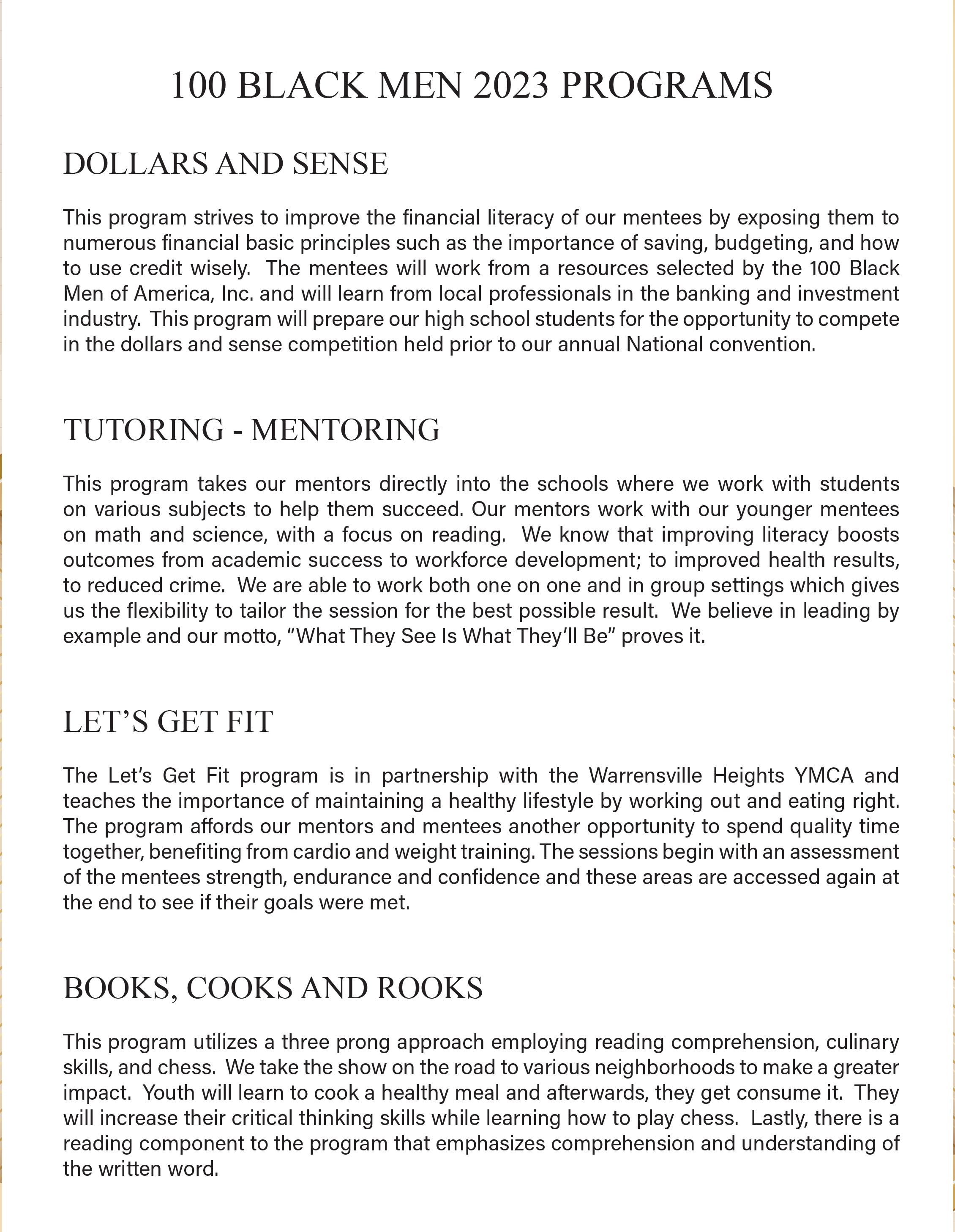



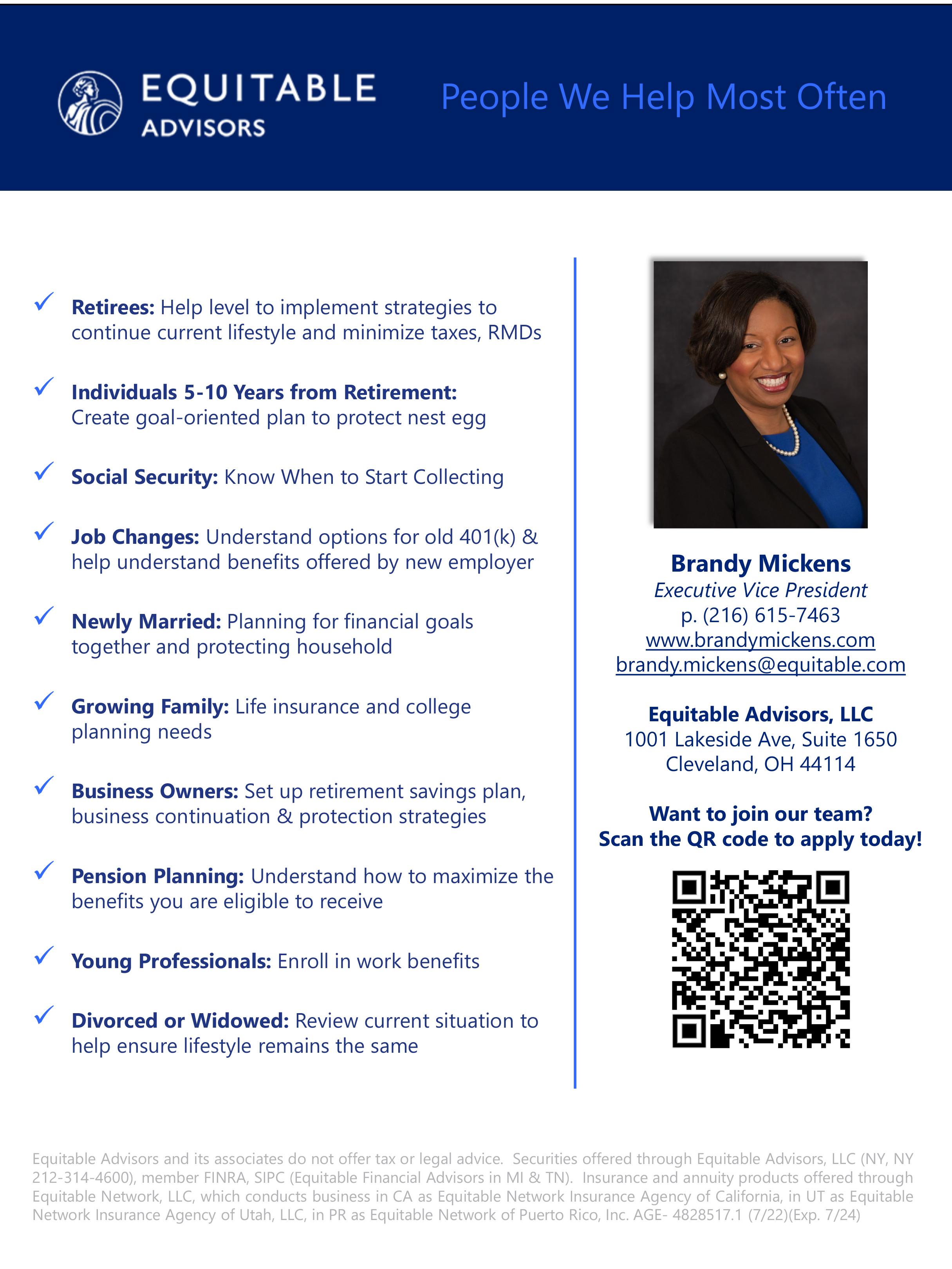
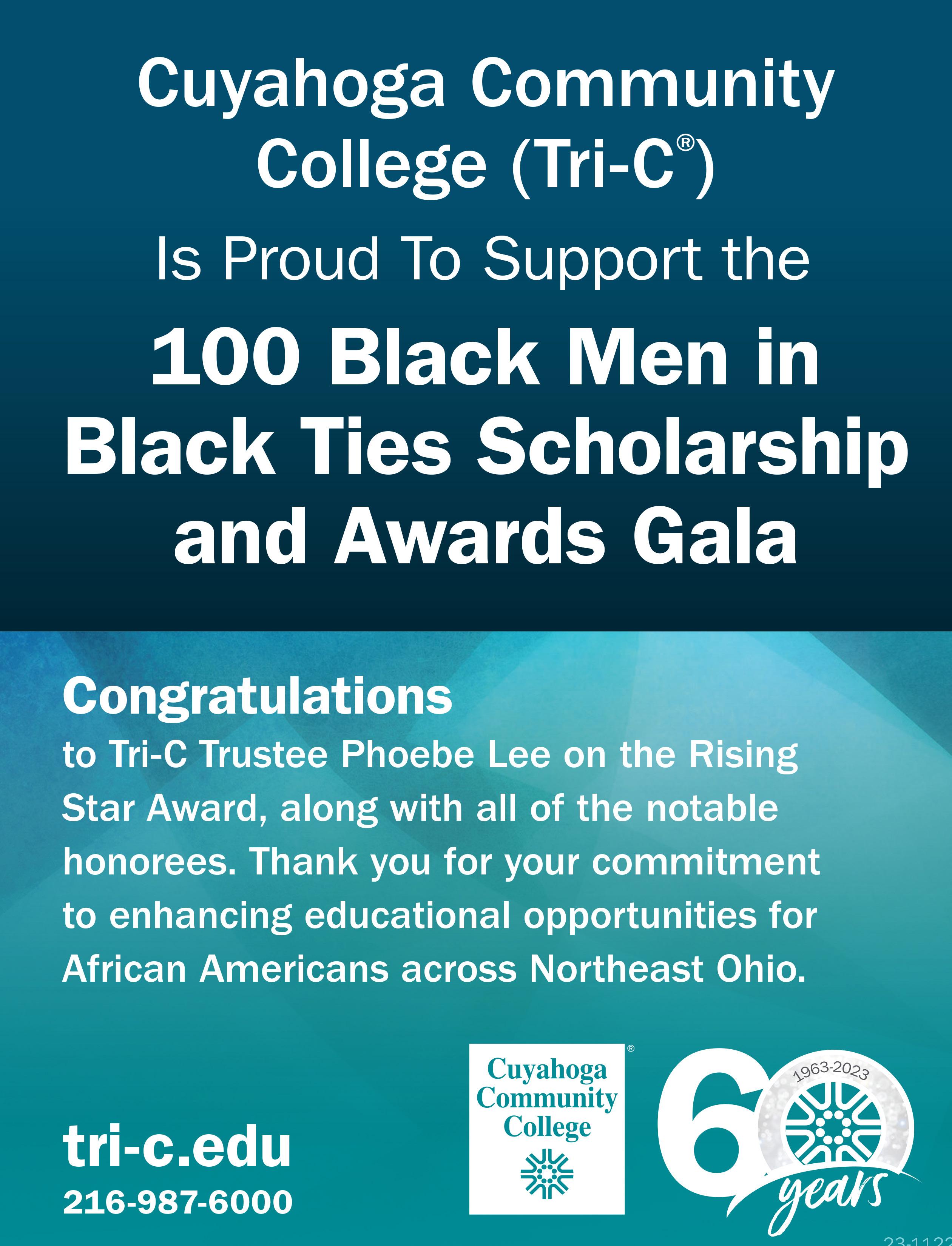
CLE Consulting Firm was birthed in January of 2017 as the two partners who’ve known and respected each other’s work for many years decided to combine their areas of expertise in a new venture. The company’s primary business is supporting small businesses’ financial health and not-for-profits. LaRese Purnell and Meltrice D. Sharp combined their expertise and drive to create CLE Consulting Firm, which provides accounting, bookkeeping, tax services, business consulting, and more to families and small businesses. In launching their own business, they discovered that their mission alignment transcended their professional goals for the firm.
“We agreed on three guiding principles to be partners,” said Purnell. “First, we decided we wouldn’t do business together unless we wanted to make money because you can’t be a blessing without resources. The second thing we wanted to do was build future leaders, and the third was give back. Those three things aligned, and we knew it was right for us to come together as partners.”
Seven years after pooling their financial expertise and philanthropic drive, Sharp and Purnell have built a business that has impacted thousands in their Northeast Ohio community. Inspired to ensure their giving leaves a lasting legacy, the business partners established a donor-advised fund at the Cleveland Foundation in January 2022 to help advance their vision for a more financially empowered Greater Cleveland.
LaRese Purnell has 19 years of experience in business management, taxation, finance, and accounting. He is currently one of the Founders and Managing Partner of CLE Consulting Firm, an Accounting, Tax, and Payroll company located in downtown Cleveland. He was rated as one of
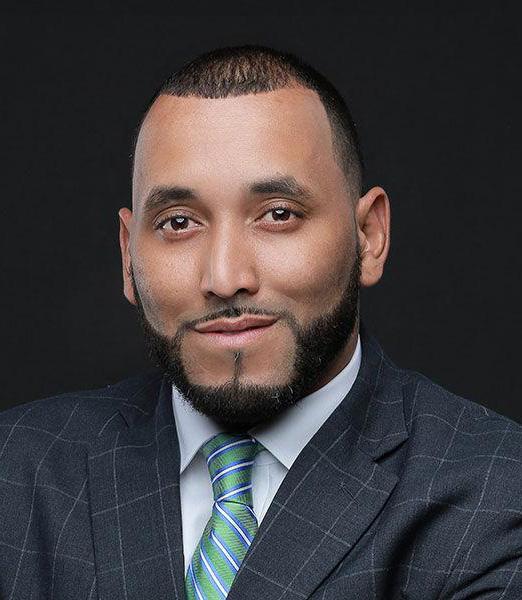
the fastest-growing firms and most prominent African American owned and operated Accounting Firms in Northeastern Ohio by Smart 50 Business. Nearly 55% of his clients are large to mid-size nonprofits from various markets.
He is a strong, innovative financial and strategic leader with instincts and intellect, a formidable combination in the business world. He has served in executive positions leading business and financial departments within multi-million dollar for-profit and nonprofit corporations.
LaRese received an MBA in Finance from the University of Toledo. He is currently finishing his Master’s in Accountancy in Corporate Taxation from John Carroll University, with an expected
completion date of December 2023. He was a part of the Leadership Cleveland class of 2022 and is currently a part of the Leadership Ohio class of 2023.
LaRese is committed to the community and its residents, so he serves on the following Board of Directors as the Business Volunteers Unlimited (BVU) leading a minority pipeline initiative to ensure African Americans are provided opportunities to serve on Boards across Northeastern Ohio, Board Member of The Cleveland Clinic SP Hospital, the Treasurer USS Cleveland Legacy Foundation, and former Treasurer now Chairperson for Step Forward Today formerly (CEOGC) the largest community action agency in the State of Ohio with a $70 million + budget, he also is proud to serve as the National Treasurer for the 100 Black Men of America and the Co-Chair of the Economic Program Committee. He just ended his 3-year term as the Treasurer for the NAACP of Greater Cleveland and Citizens for the Cleveland Public Library System. He is a proud member of Alpha Phi Alpha Fraternity, Incorporated, and the 100 Black Men of Greater Cleveland Inc.
He’s the author of Financial Foundations, Building Financial Freedom One Tool at a Time, a bestselling book that uses everyday language to address people’s most fundamental questions about money. He has traveled to over 35-40 cities nationally to teach financial literacy at various conventions, seminars, colleges and universities, and other events. He also created an organization called The Real Black Friday, whose purpose has been to bring awareness to and create educational and collaborative opportunities for hundreds of small black-owned businesses throughout Ohio with an economic impact of nearly 5.5 million dollars.
He has been featured in various local and national publications and has appeared on multiple radio and television programs
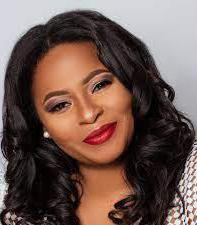
discussing Financial and Tax matters. He has received various awards, including the Smart 50 Business award, Crain’s Business 40 under 40, Cleveland Magazine’s Most Interesting People, AKA Leadership award, and various other recognitions. He was just inducted into his High School Hall of Fame in 2022 and inducted into the Ginn Academy Hall of Fame by Coach Ted Ginn Sr.
Outside of work, LaRese stays busy spending time with his beautiful wife Rashaunda, his sons (Gaven and Maceo), and daughter (Gabbi), reading, playing sports, attending church, and traveling.
Meltrice D. Sharp, CPA, is a native of Cleveland, Ohio, and a managing partner at Creating Leading Enterprises (CLE) Consulting Firm, an accounting and consulting firm offering accounting, tax, payroll, and business consulting
services to small and middle-market companies, nonprofit organizations, religious organizations, and individuals. With more than twenty years as a CPA, Meltrice has extensive knowledge and experience in accounting, tax, management, finance, and business consulting.
She started her accounting career at Ernst & Young as an auditor. She remained there for four years before joining Forest City Enterprises, where she served in a variety of accounting and finance positions for the next thirteen years. Inspired by a deep desire to use all she had learned over the previous two decades to chart a path of her own, she decided in 2017 to begin her journey as an entrepreneur.
Meltrice received her BBA with a concentration in accounting from Kent State University and her MBA from Baldwin-Wallace University. She is an adjunct instructor at Cuyahoga Community College (Tri-C), teaching various accounting courses. Meltrice is the Founding Member of Women Creating Wealth & Impact, an organization that addresses the education, knowledge, and access gaps with women and finance. She was the president of the Black Professional Association Charitable Foundation (BPACF) and Treasurer of the National Association of Minority Contractors, Northern Ohio (NAMC).
Meltrice is a trustee for the Deaconess Foundation and the Women of Color Foundation. She is also a member of the Business Advisory Committee for Tri-C and the Marketing Advisory Committee for JumpStart. Meltrice is also a proud member of Alpha Kappa Alpha, Omega Chapter of Cleveland, Ohio. Meltrice devotes a significant amount of her personal time civically, giving back to her community.
She attends Faith Fellowship Church and is a loving and devoted wife, mother, and grandmother. Her favorite pastime is hanging out with her family and telling corny jokes. (Her children remind her that her jokes are not funny while they are laughing.) Meltrice’s guilty pleasure is vegging out on the couch and watching reality TV shows.
“When people are worrying about their bills, they’re wondering how they can even think about someone else,” said Purnell. “The more we can educate people financially, the more they can create margins to give back.”
is to be the trusted accounting and professional services partner of choice. We accomplish this through building relationships, promoting financial literacy, and improving the economic landscape of our communities.
Operating a successful business takes an enormous amount of time and energy. As a small business owner or leader of a religious organization or not-for-profit, you have many responsibilities to ensure your business is profitable and successful. But you don’t have to do it alone. CLE Consulting Firm can provide accounting, bookkeeping, outsourced controllership, tax services, and more to meet your organization’s fiscal needs. Their goal and commitment are to complement your existing resources and provide the support necessary to help you grow your business, make informed financial decisions, and feel confident in the accuracy of your financial information.
To help our clients clarify and achieve their goals, position them for sustainability and success, and provide creative, personalized, solution-driven financial services.
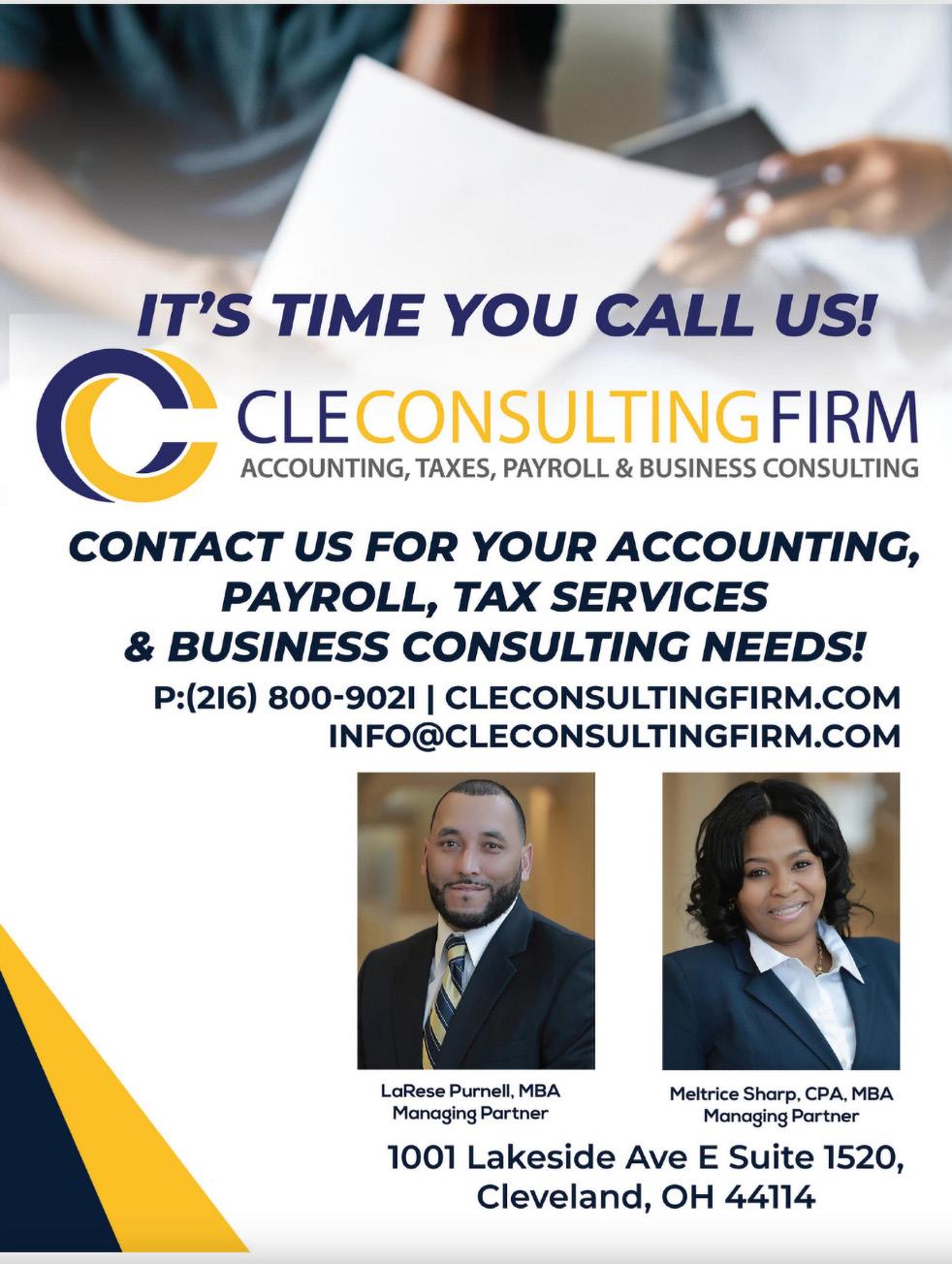
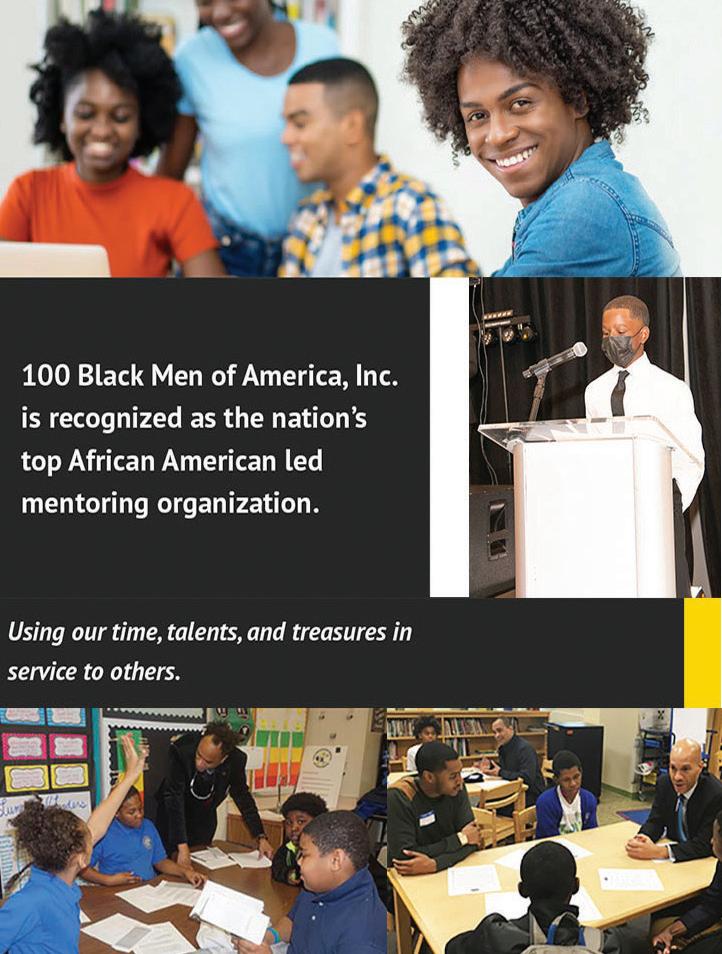
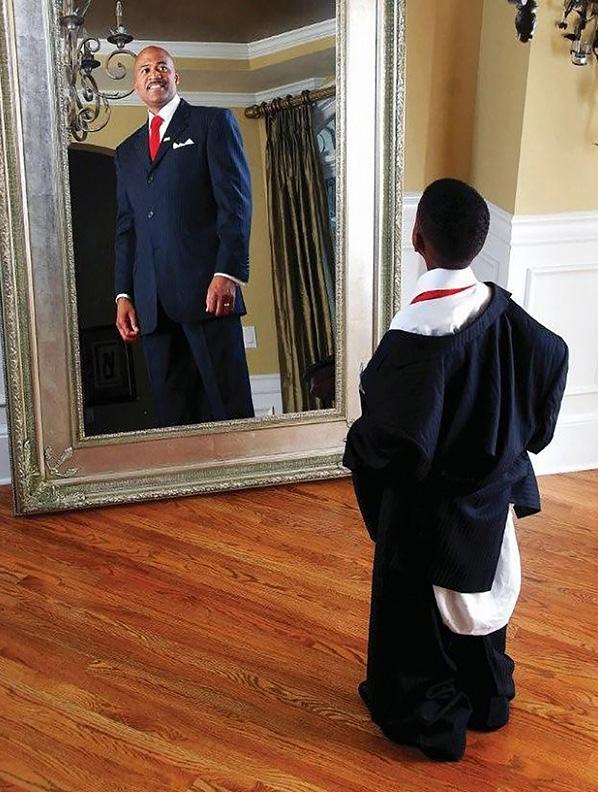
“What They See Is What They’ll Be®”

The 2023 Member of the Year of 100 Black Men of Greater Cleveland, Inc, Grady Burrows, has a remarkable commitment to the next generation. In addition to his involvement with the 100 Black Men, Burrows has been a dedicated mentor with College Now Greater Cleveland since November 2019. He epitomizes the organization’s mission to empower students and increase postsecondary educational attainment in Northeast Ohio. With a rich background in community service, Burrows embodies the spirit of mentorship and community support. Mentoring young people is one of the most important things I do as a professional. I am blessed to have the capacity and be at a place where I can do this work,” says Burrows.
College Now Greater Cleveland, the oldest and largest comprehensive, community-based college access organization in the United States, provides vital resources and guidance to students, particularly those from low-income backgrounds who are the first in their families to attend College. Through its Mentoring Program, College Now matches volunteer mentors with students, fostering meaningful relationships beyond academic guidance to encompass personal support and empowerment. Burrows is one of these volunteer mentors, and he mentors not one but two students with College Now.
Burrows’ journey into mentoring began long before his involvement with College Now. With a background in volunteerism, including roles as a Big Brother and a scout leader, and his tenure as a member of the Cleveland Metropolitan School District (CMSD) Board, Burrows has always been attuned to the needs of young people in his community. When College Now’s call for mentors, especially African American male mentors, res-
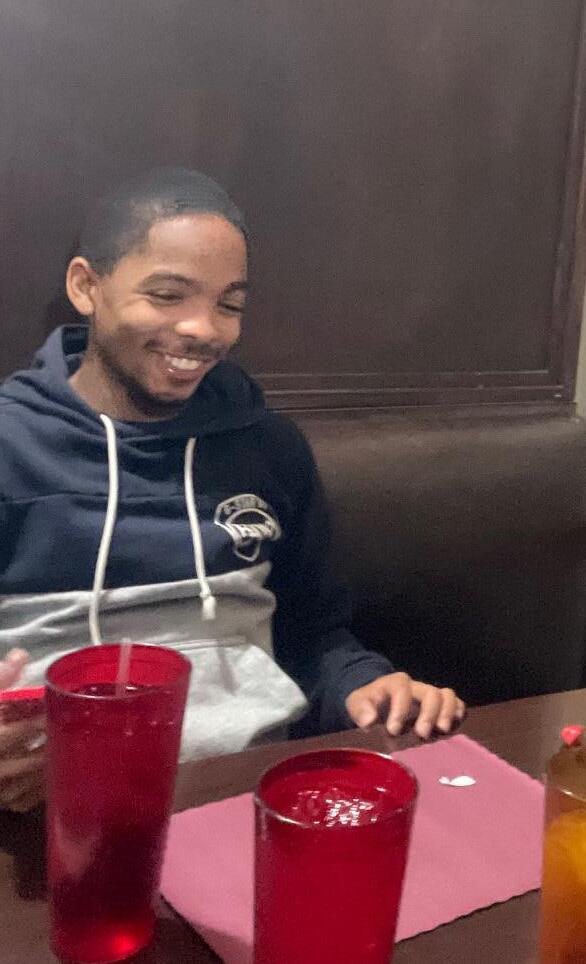
onated with him, he knew he had to answer it. His knowledge of the challenges faced by first-generation college students fueled his desire to volunteer and provide much-needed guidance and support.
According to Burrows, he was drawn to mentoring to “give a student a real-life example of the possibilities in life. Many times, students don’t know what they don’t know. Because many of them are first-generation college applicants and students, they have yet to learn of the challenges, barriers, and
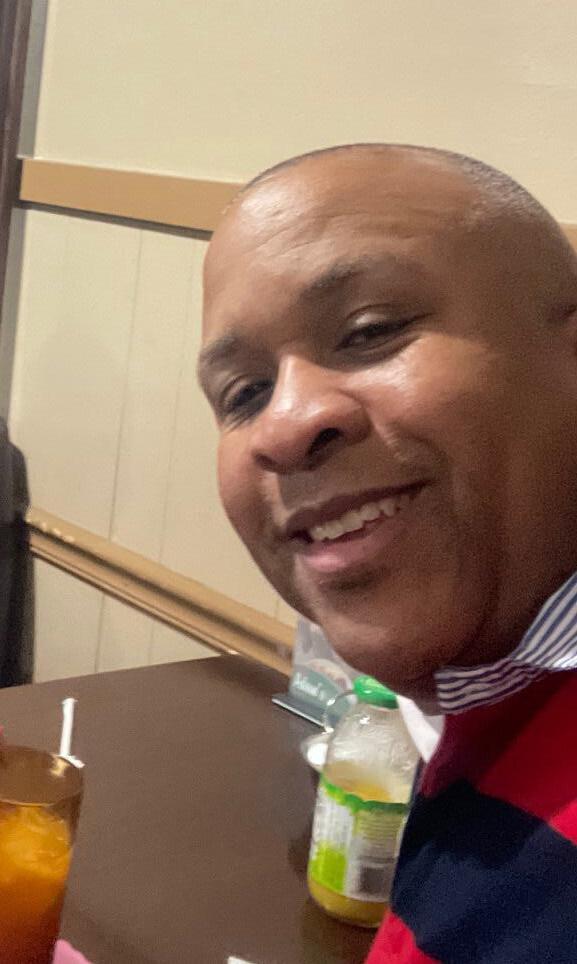
politics that must be navigated to succeed. Mentoring builds a trust model that takes advocacy to new heights and enables the student and their family to have an additional resource to be leveraged.”
His dedication to mentoring shines through in his experiences with his two College Now mentees, Ser’ja and Jermaine. Despite the differing circumstances of each mentee, Burrows’ commitment to their success remained unwavering. From encouraging Ser’ja through the challenges of transitioning
to online learning during the COVID-19 pandemic to supporting Jermaine, an adult learner balancing education and work, Burrows exemplifies the essence of mentorship – providing guidance, encouragement, and a steady hand during both triumphs and setbacks.Beyond his role with College Now, Burrows is the Education Chair of 100 Black Men, advocating for increased representation of African Americans in professional IT roles.
For Burrows, mentorship is about individual success, empowering communities, and paving the way for future generations. By serving as a role model and advocate, he aims to inspire young people to pursue their dreams and envision possibilities beyond their current circumstances. As the landscape of education and mentorship evolves, organizations like College Now and 100 Black Men play a crucial role in bridging gaps and providing essential support to students. Burrows recognizes the significance of these organizations in standing alongside young people, offering guidance, resources, and advocacy to navigate the complexities of higher education and life in general. “Many of our young people need to see role models who look like them so they can believe that they too can reach higher heights,” Burrows shared. “It’s one thing to be told you can achieve great things, but when young people can see it for themselves, it becomes much more powerful.”
If you’re inspired by Grady Burrows’ story and want to make a difference in students’ lives, consider becoming a College Now mentor. To become a mentor, all you need is a college degree, a commitment for the duration of the student’s college journey (up to 5 years), and the ability to connect online with in-person opportunities. Visit cngc.org/ mentor to learn more and apply today. Your guidance will help shape the future of our community!
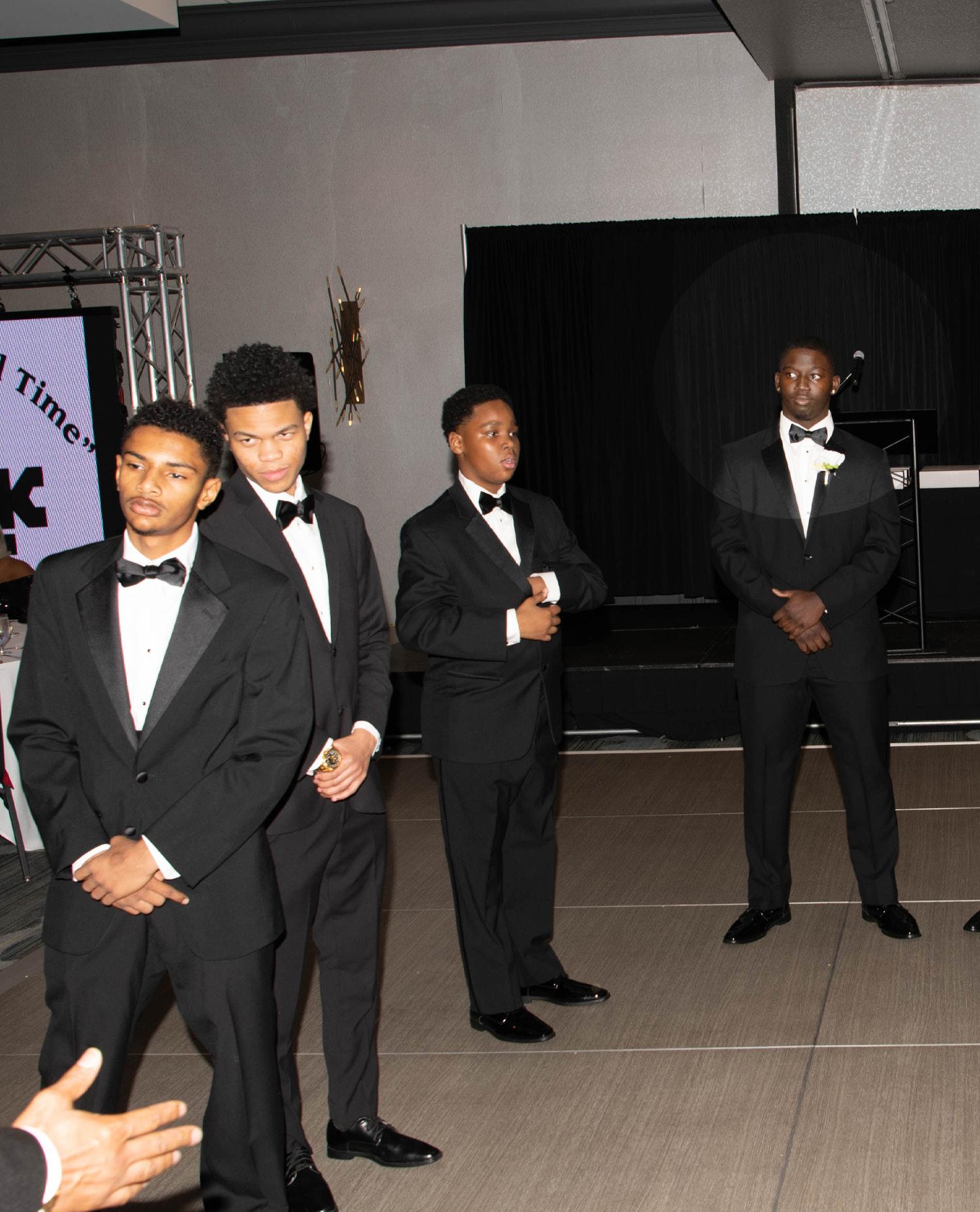



Iam Zacariah Davi Custódio, a freshman at John Hay Early College High School. I like to play baseball and video games. I also like to go for walks and exercise. I have been a mentee for almost three years and have had many great opportunities. For example, I have had the chance to attend the 37th Annual Conference in Las Vegas and compete against the other 100 Black Men chapters nationwide in the “Dollars & Sense competition.” Another opportunity was the honor of speaking at one of the Black-Tie Galas.
Being a 100 Black Men mentee has dramatically impacted my life. So far in 2024, I’ve already had the chance to attend multiple programs and events and build my personal development and fitness. I have enjoyed all the activities we’ve done with the mentorship program, especially the workouts at the Y. I have a fantastic mentor - Darian Johnson, who has always supported me and pushed me to live out the 100 creed. I can always come to him for advice, jokes, and spades. I can’t wait to participate in the National Personal Finance Challenge, the 2024 Conference, and all the other opportunities with the 100 Black Men Mentorship.
Overall, I enjoyed the Gala, where I experienced being in front of many business individuals and our sponsors. I am honored to have had the privilege to attend. Being a part of the 100 Black Men Mentee Program thus far has been such a great experience, and I couldn’t be more excited to see what they have in store for me in the future.
I look forward to when I get older, I will become a member and be a mentor myself.
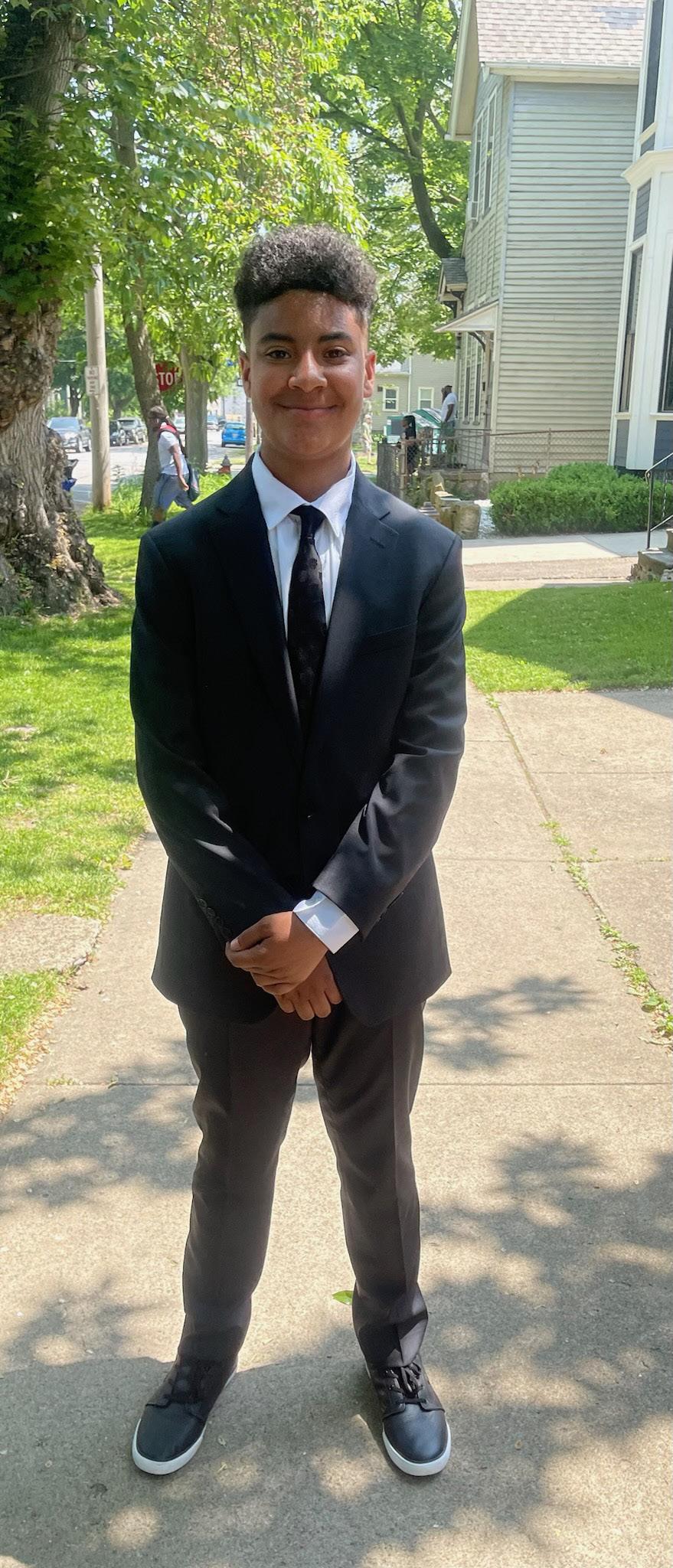
After working as a pediatrician for five years, I contemplated ways to get involved and give back to the community I serve. In the year 2000, I discovered the 100 BMOGC via Ms. Barbara Palmer, a longtime volunteer of the organization. Specifically, I was interested in tutoring math to youth. I soon learned of the great need to mentor youth, too.
I volunteered for a few years and then became a member. During my years, I have found sound guidance via Mr. Curtis Griggs, Mentoring Chair, Chairman Magistrate Gregory Clifford, and Chairman Dr. Gary Carrington.
The 100 BMOGC is an organization of black men from many different viewpoints, professions, and walks of life. I believe that is a great strength, and that is a key reason I joined. Through my membership and dedication to mentoring youth consistently and persistently, I have witnessed the transformation of youth and major changes in their lives. It is these “miracles” that are the greatest joy of mentoring.
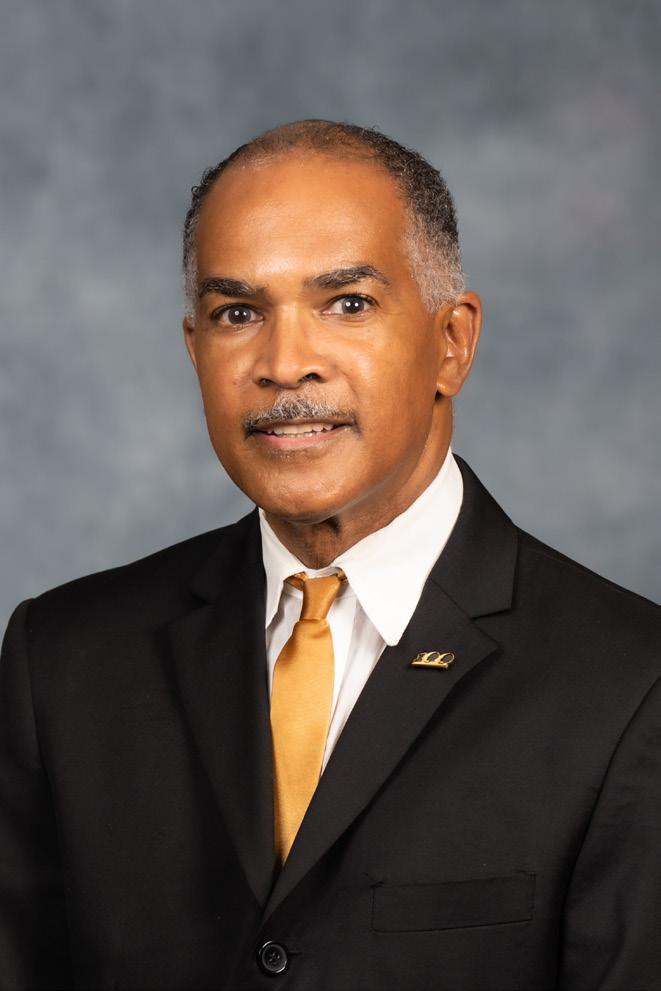
My brother, Eric, is two years younger than I am. When we were young, rarely did we physically fight. But one day, as teenagers, we did fight. Given our intensity, passion, and energy, I realized the destructive power of that moment. I knew we would never fight again. I learned patience and the art of compromise from my brother. Later, we would still disagree many times, but with mutual respect, admiration, and love (and sometimes lunch afterward). And for me, that was the biggest lesson – in all things, choose love. Mentoring often involves showing someone a different way of thinking or doing things. It can be challenging for both mentor and mentee. To effect change, being consistent and persistent in a young person’s life is essential. In my dealings with others, those I grew up with, and those I’ve met along life’s way, I try to apply those early lessons learned. For me, this is the essence of mentoring.
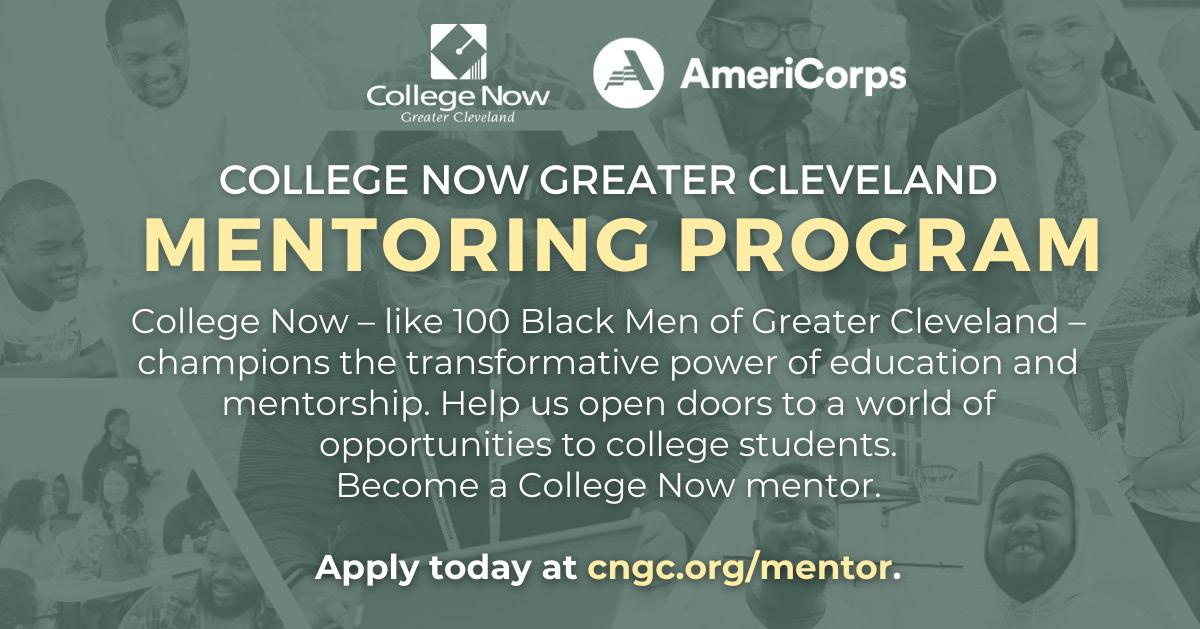



IT IS EASIER TO BUILD STRONG CHILDREN THAN TO REPAIR BROKEN MEN. - Frederick Douglass
The “Black tax” notion originated in South Africa to explain the financial assistance that Black individuals, especially those with higher incomes, provide to their relatives. This support is typically motivated by a sense of responsibility and a deep belief in fulfilling familial obligations.
Breaking the generational wealth chain in a black family can lead to feeling responsible for supporting relatives and friends, known as the Black Tax. This topic is rarely discussed in the black community and was brought to light when Sheena Allen, Founder of CAPWAY and Phocal, had a viral tweet. Black Tax is a common occurrence that can lead to family rifts, stress, and various challenges associated with the responsibility of supporting others who are not financially stable.
The Black Tax symbolizes the financial strain on prosperous Black individuals who assist struggling family members, often by transferring money to those in need. This concept highlights the impact of These monetary exchanges on the wealthy family members potentially hinder their wealth-building compared to white individuals without such obligations.
Throughout my childhood, I often heard individuals express the sentiment of simply needing to remain true to their Black identity, fulfill their tax obligations, and eventually pass away. However, some believe that giving back to those less fortunate is essential, yet they question the toll it may take on their own financial and emotional well-being before reaching a point of bankruptcy.
Black Tax refers to the financial burden on successful black individuals or families to support their less fortunate relatives or community members. This phenomenon is prevalent in many black communities worldwide and can have significant consequences on both the individuals providing the support and those receiving it. One of Black Tax’s considerable impacts is its

strain on family relationships. The expectation to financially assist relatives can create tension and resentment within families, leading to conflicts and even permanent rifts. Constantly providing for others can also cause stress and anxiety for the individuals responsible, as they may feel overwhelmed by the financial obligations and the pressure to meet everyone’s needs.
Moreover, the Black Tax can hinder the financial progress and personal development of those expected to provide support. The financial strain of supporting others can limit their ability to invest in their education, career advancement, or personal goals. This can perpetuate a cycle
of financial dependency, making it difficult for individuals to break free from the burden of supporting others and achieve financial stability.
Overall, Black Tax is a complex issue that can have far-reaching consequences. It strains family relationships, causes stress, and hampers personal development and financial stability. Addressing this issue requires a broader conversation about economic empowerment, equal opportunities, and breaking the cycle of financial dependency within black communities.


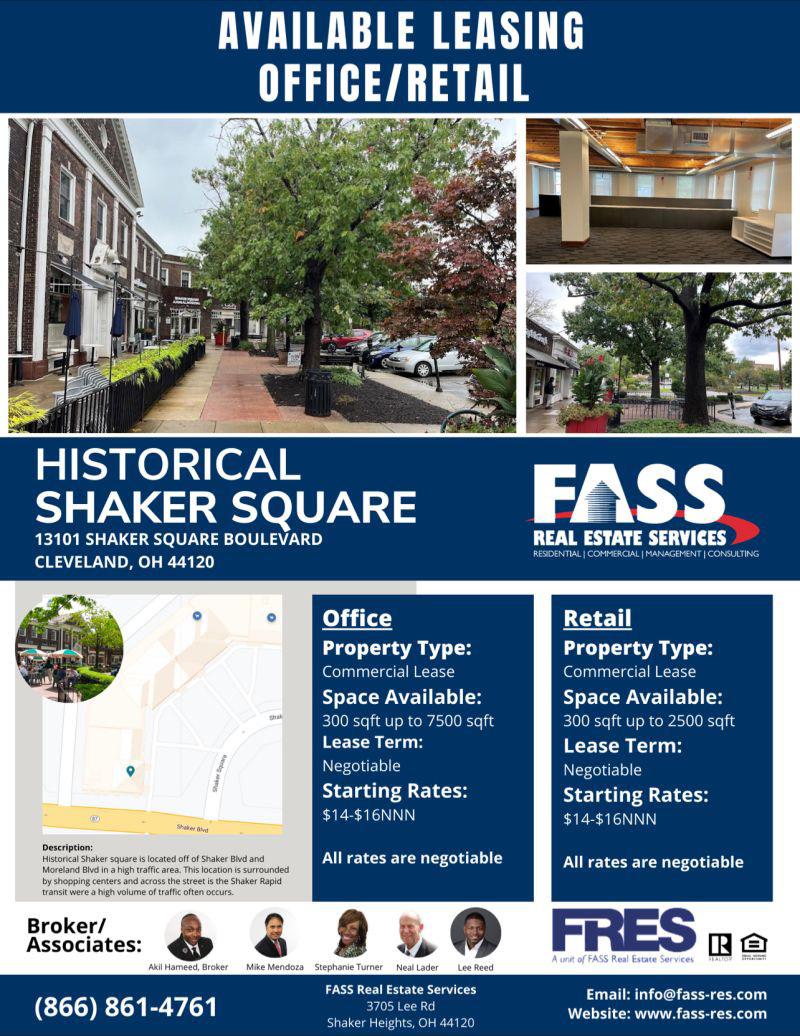
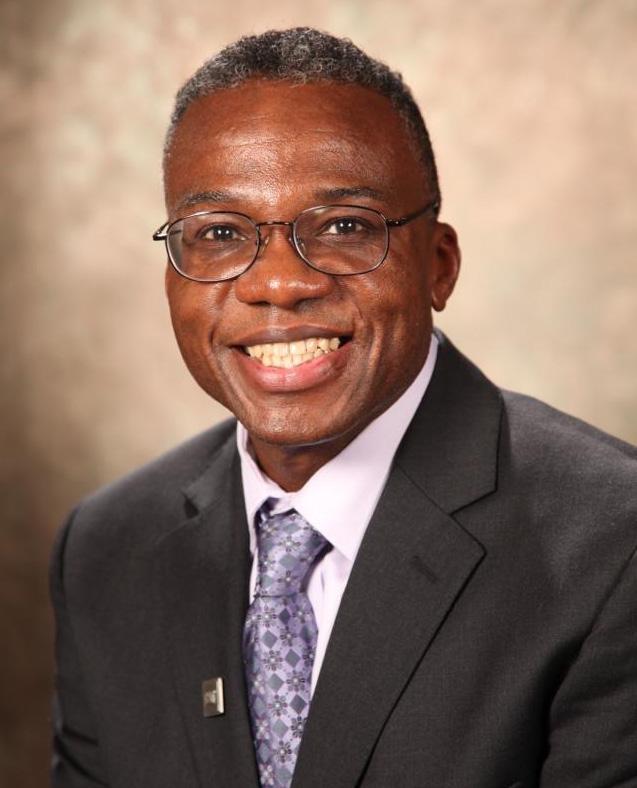
Over the years, the 100 Black Men of Greater Cleveland, Inc. has always focused on mentoring our youth and various parents, members, and friends on subjects that matter. Based on our four pillars, Mentoring, Health & Wellness, Education, and Economic Empowerment, which we are focusing on this month.
On the cover of this issue is a member who has given a lot to the organization behind the scenes, giving great words of wisdom and keeping us on the right path. This person is none other than Terry McWhorter. In 2020, Terry was elected as the Director of Finance but had to resign due to a heavy workload. He is currently serving on one of our AD Hoc committees. Terry is an attorney, CPA, and a member of the tax counsel and planning team at Danaher Corporation, a Fortune 150 global life sciences conglomerate headquartered in Washington, DC.
Terry started his career nearly forty years ago as a staff accountant at Coopers & Lybrand (now PricewaterhouseCoopers) in Chicago, fresh out of undergraduate school in 1985. Shortly after, he passed the CPA examination and worked at Coopers & Lybrand until he entered law school in the fall of 1989. After law school in the summer of 1992, he returned to Chicago and sat for and passed the Illinois Bar examination. He spent the next thirty years building a solid career as a tax attorney, spending the first three years as an Illinois Assistant Attorneys General representing the Illinois Department of Revenue, followed by 13 years in private practice in Chicago, where he helped found his law firm, McWhorter Walker Lucy, P.C., in Chicago. MWL specializes in commercial and residential real estate transactions, business and commercial law, and state and federal tax litigation.
In 2001, he accepted an opportunity to work as an Attorney-Advisor in the IRS National Office of the Chief Counsel in Washington, DC, in its Income Tax and Accounting technical division. He spent five years with the IRS Office of Chief Counsel before landing a spot as a senior tax manager at KPMG –Washington National Tax Practice in Washington, DC, where he advised corporations on complex income tax and methods of accounting issues.
In 2006, the multinational earth-moving equipment manufacturing company Caterpillar, located in Peoria, Illinois, offered him an opportunity to join its in-house legal team as senior corporate tax counsel, where he focused much of his attention on corporate income and employment tax matters and tax controversies.
In the summer of 2018, Terry joined Danaher in his current role, where he is responsible for helping the company mitigate its worldwide tax risk through strategic US and international tax planning initiatives, tax audit and controversy support, and technical legal tax guidance.
He is an active member of the Tax Executives Institute (TEI), a professional association of inhouse senior tax professionals. He previously served on the executive board of the Cleveland Chapter of TEI. As a member of the executive board, he served a year as Treasurer, followed by a year as Secretary. Terry is the immediate past chair of the Fathers’ Auxiliary of the Greater Peoria, Illinois Chapter of Jack & Jill of America and an active member of Phi Beta Sigma Fraternity, Inc.
He is a 1981 graduate of Western Reserve Academy in Hudson, Ohio, and received his
undergraduate degree in accounting from Washington & Lee University in Virginia, his law degree from the University of Cincinnati College of Law, and his Master of Laws (LL.M) degree from the University of Miami (FL) School of Law, Graduate Program in Taxation.
Terry was introduced to the 100 Black Men of America in Chicago shortly after passing the Bar exam in the fall of 1992. He and several young black lawyers were invited to an event hosted by the 100 Black Men of Chicago. “I immediately got involved and was engaged for a few years until I realized my 8:00 am to 10:00 pm workday was getting the best of me. So, I let it go for a while,” said Terry. However, years later, he re-
engaged, this time with the 100 Black Men of Central Illinois, and has been an active member since, most recently with the 100 BMOGC.
Terry feels it’s vital for consumers and businesses to maintain tax records for at least the last ten years because the law requires it, so that is a good enough reason. Also, it is best practice to have some document retention policy or procedures, and not just for tax records, which, by the way, can be a whole host of various other books and records, including nonfinancial records. The period of record retention required under federal tax law actually varies. It can be anywhere from two years to indefinite. But if you timely file your return and are confident in the tax positions
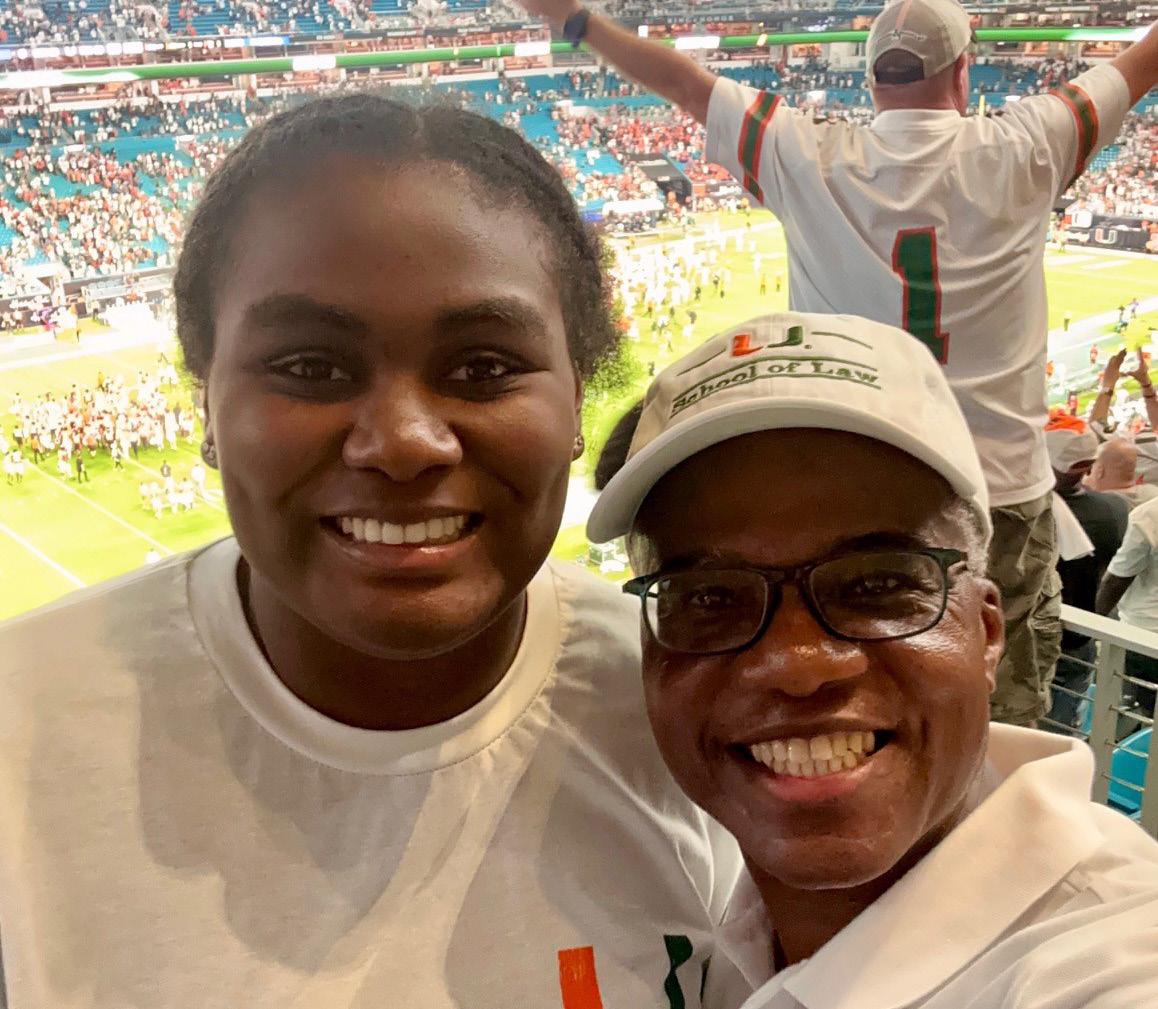
taken thereon, then seven years is a safe time to keep your books and records with respect to those returns since the statute of limitations will eventually kick in to prevent the IRS from doing much after the statute runs - most of the time. Of course, if one fails to file, then all bets are off, and the statute never starts to run. “That person may want to hold on to records indefinitely or have an excellent criminal tax attorney,” said Terry.
Terry shared that deductions are a matter of legislative grace. If Congress says you can deduct it, then you can deduct it. If they do not, then you should not. But of course, it’s more complicated, right? All Congress has said is that taxpayers may deduct any “ordinary and necessary” business expenses. I have spent a career litigating what are “ordinary and necessary” business expenses. And I would be the first to say that trying to figure that out can be a slippery slope.
Heck, one taxpayer’s ordinary and necessary business expense is another taxpayer’s hobby loss

and, thus, may not even be deductible. This said, most small business owners have pretty much the same type of routine business expense items, for example, wages, office or facility rent, insurance, utilities, transportation, and the like. These are pretty straightforward. It gets a little trickier where the expenses may be for a home office, business use of a personal vehicle, travel expenses for trips that are part business, part personal, and so forth. “Again, my advice is to keep solid books and records and ensure you are working with a competent tax advisor along the way,” said Terry.
If you ever take the time to talk to McWhorter, one thing is for sure: he will end up saying something about his daughter. “My most favorite hobby is hanging with my kiddo. We are huge college sports fans with a solid loyalty to two of my alma mater, the University of Miami Hurricanes and the University of Cincinnati Bearcats. We have season football tickets for the Canes and season football and basketball tickets for the Bearcats. Of course, the “U” is where we spend most of our time during the season. Heck, I’ve been a season ticket holder there since 2001. Morgan was just eleven months old when she went to her first college football game in the fall of 2009, and we have been going strong ever since,” said Terry.
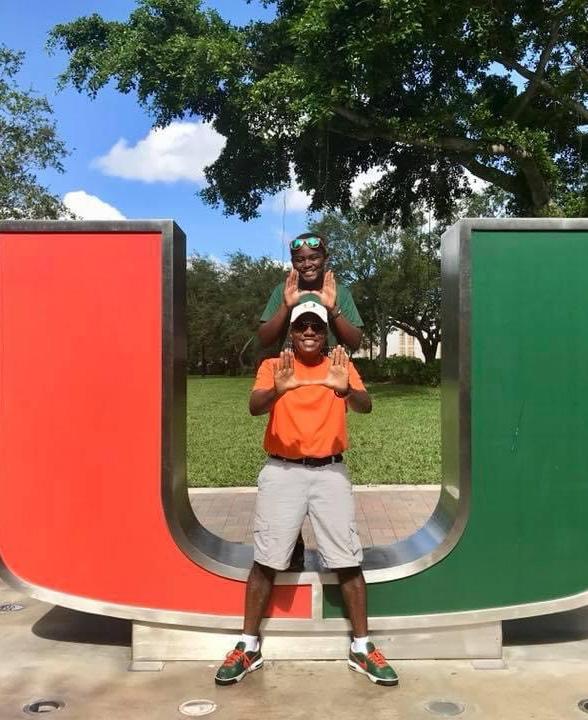
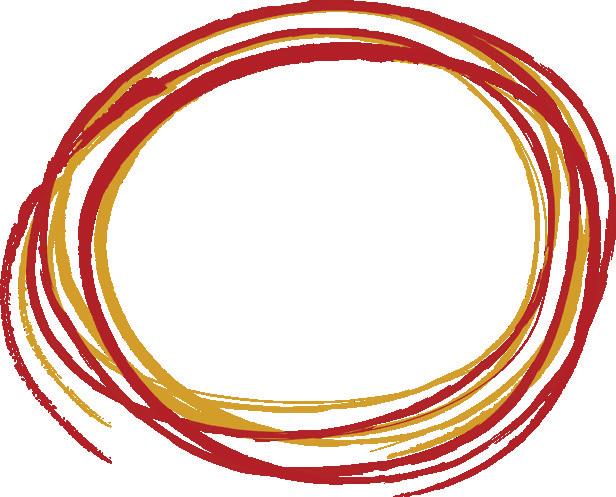

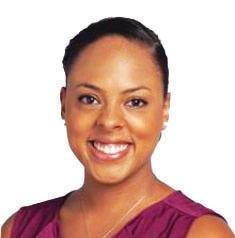
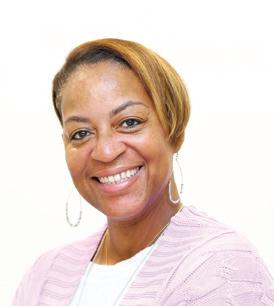

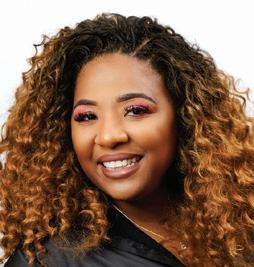
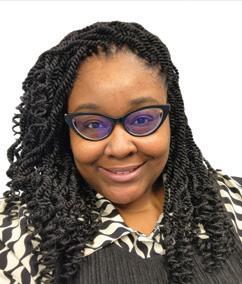
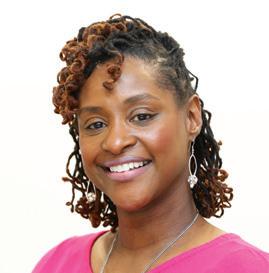


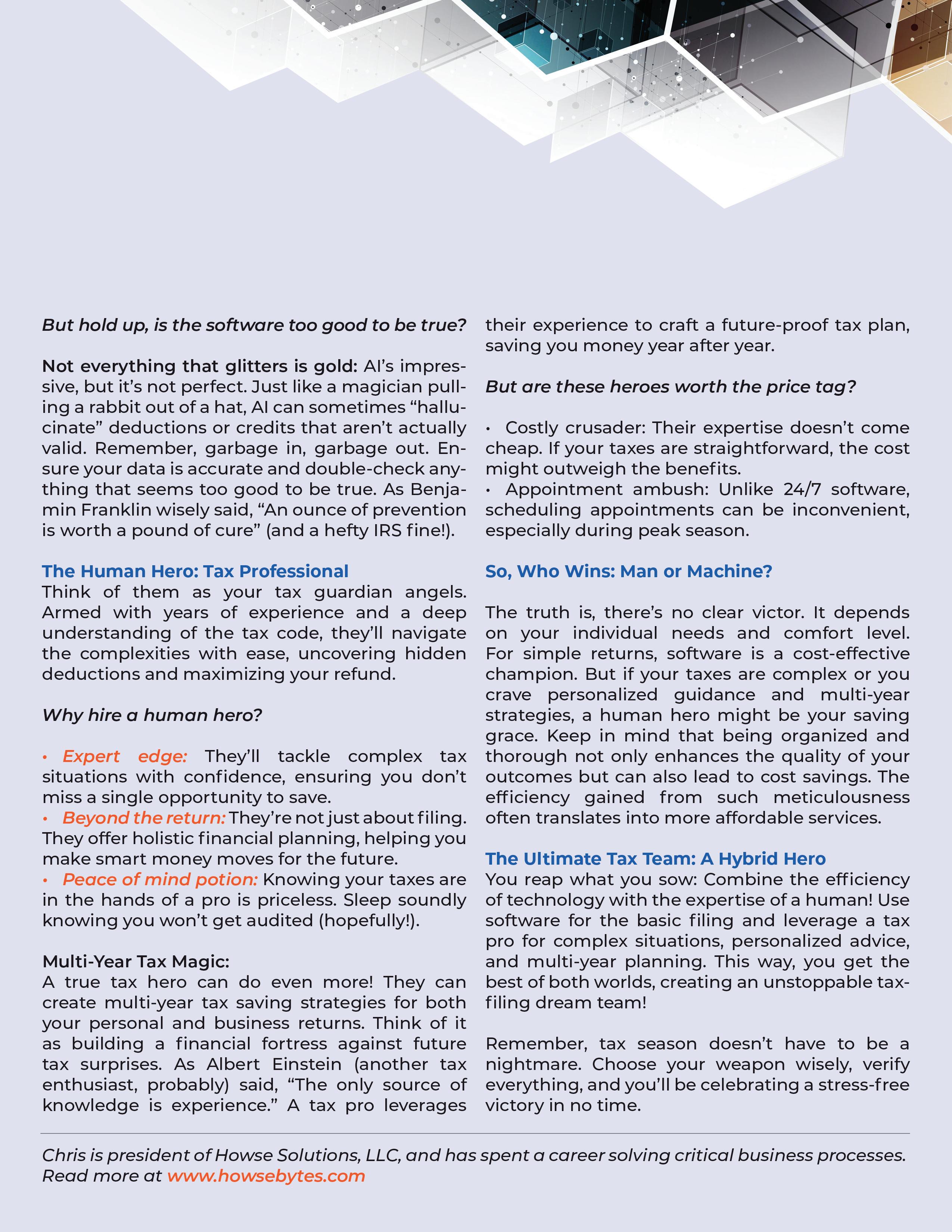

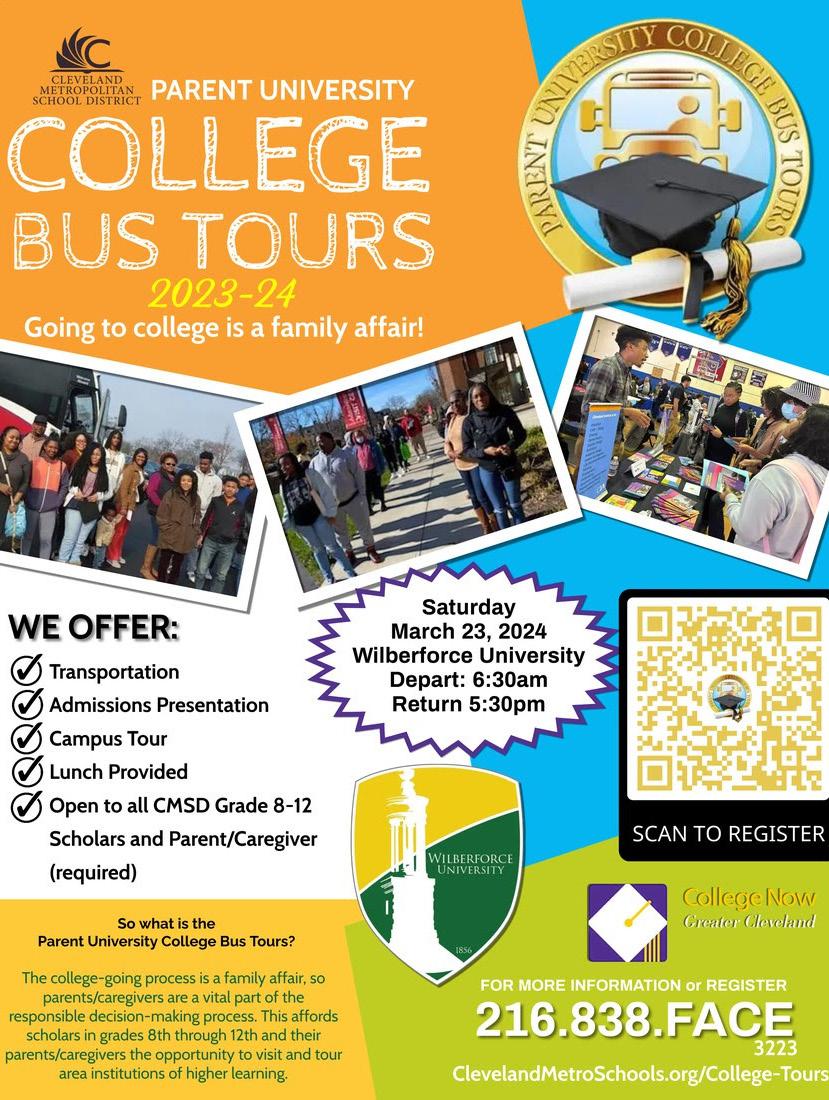
The Cleveland Chapter of the 100 Black Men of Greater Cleveland, Inc. has been doing great things in Cleveland. While Real Men Magazine has focused on everything Financial in this issue, Economic Empowerment has to be included for this edition; our chair for Economic Empowerment, David L. Taylor, has hit the ground running.
Taylor is the Assistant Vice President and Chief of Staff for Treasury Services at the Federal Reserve Bank of Cleveland. His responsibilities at the Federal Reserve Bank of Cleveland include advising and supporting senior leadership on department strategy, executive communication, cross-functional team alignment, and stakeholder management.
He joined the organization in 2012 as a business systems analyst. In his most recent role, he led the Transition Management team for the Cash Product Office’s National Cash Automation business group. He also played a crucial role in Federal Reserve System initiatives.
He participates in the Federal Reserve Bank of Cleveland Executive Sponsorship and Bank Mentorship programs. He is a Strengthening Talented African American Resources (STAAR) resource network group member. He is a Six Sigma Green Belt and project management professional (PMP).
Coming into the Cleveland Chapter, he was in a class of 2i other candidates looking to make a difference with our mentees and give back to the Greater Cleveland area.
“While I was aware of the 100 Black Men based in Atlanta, I learned about the 100 Black Men Greater Cleveland Inc. chapter from my coworker Alfie Chatman-Walter. She knew my
passion for and desired to do more communityrelated work and thought I would be an excellent addition to the organization,” said Taylor.
RM: How do you feel about giving back to youth and the community?
I’ve been surrounded by examples of strength and success built from the community. From my family, childhood neighborhood, fraternity (Phi Beta Sigma Fraternity Inc.), and college, contributing to my community allowed me to represent something larger than myself and see the immediate positive impacts. Giving back to youth is a way to pay it forward and continue diversifying my thoughts by hearing their stories.
RM: Do you have any hobbies, or do you like sports? Who’s your favorite team?
My hobbies include working out, playing sports, listening to music, and traveling. I remain a loyal New York fan of the New York Giants, New York Knicks, and New York Yankees. I also root for the Brooklyn Nets (it’s only sometimes a borough gets its’ team!).
“I’m very excited about the opportunity to serve as the Economic Empowerment Chair for the 100 Black Men of Greater Cleveland Inc. One of my main plans for the year is to demystify the role of the Federal Reserve Bank of Cleveland for the membership and the community. Additionally, I’m looking to provide various learning opportunities around financial literacy to achieve excellent financial stability and wealth generation amongst all participants,” said Taylor.
The Cleveland Chapter is also excited to have Taylor in the chapter and chair this committee. He holds a Bachelor of Science in computer science with a minor in mathematics from
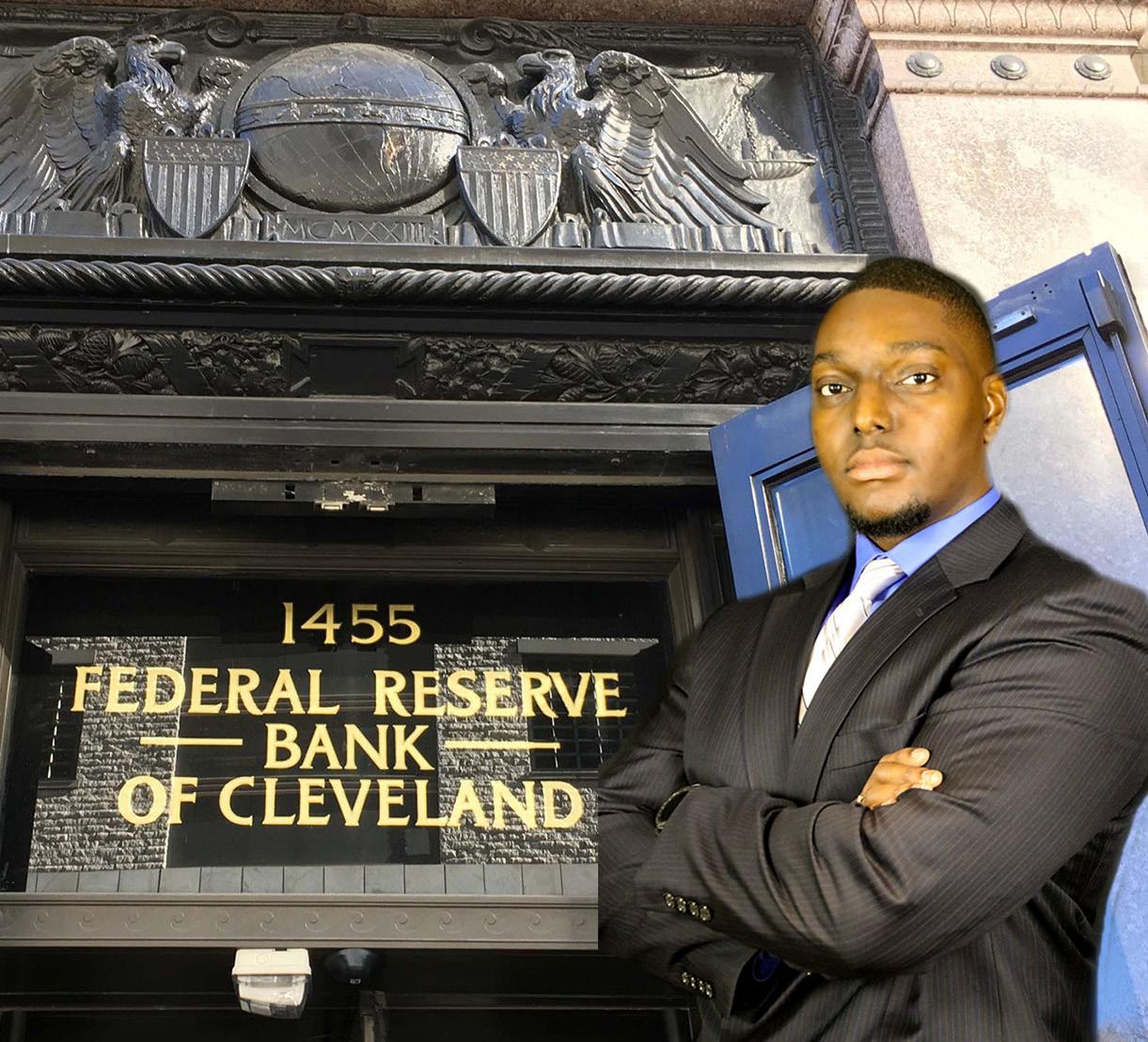
Morehouse College. His mother is retired and continues to reside in New York City. My wife is a Cleveland native, food scientist, and trained chef, and she runs an organization focused on food and nutrition literacy in the Cleveland area.

People who have sickle cell trait (SCT) inherit a hemoglobin “S” gene from one parent and a normal gene (one that codes for hemoglobin “A”) from the other parent. People with SCT usually do not have any of the signs of the disease. However, in rare cases, a person with SCT may develop health problems; this occurs most often when there are other stresses on the body, such as when a person becomes dehydrated or exercises strenuously. Additionally, people who have SCT can pass the abnormal hemoglobin “S” gene on to their children.
hemoglobin “S.” Hemoglobin S is an abnormal form of hemoglobin that causes the red cells to become rigid and sickle-shaped. This is called sickle cell anemia and is usually the most severe form of the disease.
In a meeting with a Red Cross representative, she explained the importance of African Americans donating blood, and it was stated. Caucasian would not have the same blood type to help with sickle cell.
serious complications (health problems) such as infection, acute chest syndrome, and stroke.
By James W. Wade III Managing EditorWe face various health issues, including diabetes, high blood pressure, cancer, and Sickle Cell. People with this form of SCD inherit two genes, one from each parent, that code for
Sickle cell disease (SCD) is a group of inherited red blood cell disorders. Red blood cells contain hemoglobin, a protein that carries oxygen. Healthy red blood cells are round and move through small blood vessels to carry oxygen to all body parts. In someone with SCD, the hemoglobin is abnormal, which causes the red blood cells to become stiff and sticky and look like a C-shaped farm tool called a “sickle.” The sickle cells die early, which causes a constant shortage of red blood cells. Also, when they travel through small blood vessels, they get stuck and clog the blood flow. This can cause pain and other
SCD is diagnosed with a simple blood test. In children born in the United States, it is most often found at birth during routine newborn screening tests at the hospital. In addition, SCD can be diagnosed while the baby is in the womb. Diagnostic tests before the baby is born, such as chorionic villus sampling and amniocentesis, can check for chromosomal or genetic abnormalities in the baby. Chorionic villus sampling tests a tiny piece of the placenta called the chorionic villus. Amniocentesis tests a small sample of amniotic fluid surrounding the baby. Because children with SCD are at an increased risk of infection and other health problems, early diagnosis and treatment are essential.
Sickle cell anemia is rare in the United States, affecting about 100,000 people. It primarily affects people whose ancestry links back to parts of the world where many people have malaria and carry a gene that partially protects against anemia. This gene also causes sickle cell anemia. In the United States, sickle cell anemia affects many people who are Black. It

may also affect people from southern European, Middle Eastern, or Asian Indian ancestry.
Anyone with sickle cell anemia, including babies, is at risk for stroke. Approximately 11% of people with sickle cell anemia have strokes by age 20, and 24% have strokes by age 45. Here is information on stroke symptoms:
•Severe headache.
•Sudden weakness on one side of your or your child’s body.
•Change in alertness.
•Trouble speaking.
•Trouble seeing.
•Trouble walking.
Splenetic sequestration
This happens when sickled cells become stuck in your spleen, forcing your spleen to get larger. Splenic sequestration often causes acute anemia. Symptoms include:
•Pain in your upper left belly (abdomen).
Children’s enlarged spleens are sometimes visible or can be felt through their skin.
Bacterial infections
People with sickle cell anemia have an increased risk for infections caused by Streptococcus pneumoniae, Haemophilus influenzae, and non-Typhi Salmonella species. Symptoms include:
•Fever.
•Coughing.
•Trouble breathing.
•Pain in bones.
•Headaches.
The Red Cross needs your help battling this disease; they ask you to consider donating blood to help Sickle Cell patients. Who better to help than African Americans? Visit their website for more information at RedCrossBlood.org.

Blood donors from all racial and ethnic backgrounds are needed, because patients from all backgrounds need the lifegiving gift of blood.
As an ethnic blood donor, you may have the unique ability to help patients with special needs. Many ethnic minority groups have rare blood types, such as types U negative and Duffy negative, which are distinctive to their community and serve specialized purposes.


As a result, an ethnic minority patient with sickle cell disease is more likely to find a match among those of the same ethnic background.
The Red Cross also works to find rare blood donors to meet the specialized needs of patients all over the country. Through its 39 Immunohematology Reference Laboratories, offering support to hospitals across the country, and its collaboration with AABB on the American Rare Donor Program, the Red Cross helps insure that patients will get the blood they need at any time of the day or night.
It is vital that our blood supply reflect the diversity of our population to best meet the needs of all. Whether AfricanAmerican, Asian-American, Native-American, Latino, or one of the many other ethnic populations that make up the rich mosaic of our country, your donation matters.
People of various ethnic backgrounds can suffer from a common debilitating condition related to blood disorders. These disorders can require regular blood transfusions to alleviate pain and continue to allow the individuals to live.
The best chance for a successful transfusion comes from blood donors of similar ethnic backgrounds, because each ethnicity has specific phenotypes in their blood. The best match for one patient is not necessarily the best match for another patient. Your donation may match a patient with specific needs.
I am afraid of needles. At your Red Cross blood drive, only trained staff members will draw your blood. You will feel a brief pinch, but the donation itself is not painful.
Is it safe to give blood?
Your safety is our priority. A fresh, disposable tubing and collections set are used with each donor. Each needle is used only once and then discarded.
Is blood typed, labeled and distributed by race? Blood is typed, labeled and distributed to hospitals with no indication of gender or race of the donor.
If there is a blood shortage, will I be able to get blood if I end up in the hospital? The American Red Cross makes every effort to ensure that area hospitals have blood available when patients need it. We cannot meet the need without your generous gift of blood donation.
Is my privacy protected? Yes, all information is held in absolute confidence in the Red Cross data bank. The Red Cross must maintain your confidentiality, and will not share information without your specific written consent.
What happens to my blood after it is collected?
Your donation is stored at the Red Cross Facility. Blood samples are checked for viruses and other communicable diseases including HIV and Hepatitis C. Those units that pass the testing criteria are released to hospitals usually within 48 hours for patients’ use. If an abnormality is detected, a donor counselor will contact you to discuss the findings. This is done in strict confidence.
Am I eligible to donate if I have a health condition such as diabetes, anemia, high blood pressure, heart disease, etc.? Those with chronic illnesses such as diabetes or high blood pressure may still be able to give if the condition is kept under control through medication.

The best blood match for patients often comes from donors of similar race or ethnicity. It is extremely important to increase the number of blood donors from all racial and ethnic groups. Red Cross and Sickle Cell Disease Association of America, Inc. supporters, such as you, can help connect our organizations with donors that best meet the needs of patients of all backgrounds.
• While the most common blood groups are based on the presence or absence of two antigens in the blood, called ‘A’ and ‘B’, there are in fact more than 600 known antigens that create a wide spectrum of rare blood types.
• Blood types are hereditary. Certain blood types are unique to specific racial and ethnic groups. For example, U-negative and Jsb negative blood types are found more often in people of African descent. So sickle cell patients that require these blood types must rely on donors with matching blood types from people of African descent.
• An African-American blood donation may be the best hope for the needs of patients with sickle cell disease, as over 90% of sickle cell patients are of African descent and will require multiple transfusions over their lifetime. Blood from people of the same race and ethnicity can mean fewer health complications after a blood transfusion.
• Recruit organizations that have diverse employees/members to host blood drives and support blood donation.
• Set up a virtual blood drive on RedCrossBlood.org/SleevesUp and encourage others to donate.
• Utilize MatchUp, a challenge platform on SleevesUp (at RedCrossBlood.org/SleevesUp), to initiate a friendly blood competition.
• Educate and engage your network about the importance of diverse donor pools.
Aaron was diagnosed with sickle cell anemia when he was 2 years old and endures the pain associated with this debilitating disease on a daily basis. A key component in his pain management is receiving multiple units of blood every three weeks. He is able to live a relatively normal life through the generosity of strangers who voluntarily donate blood.
Learn more at: RedCrossBlood.org/SickleCell



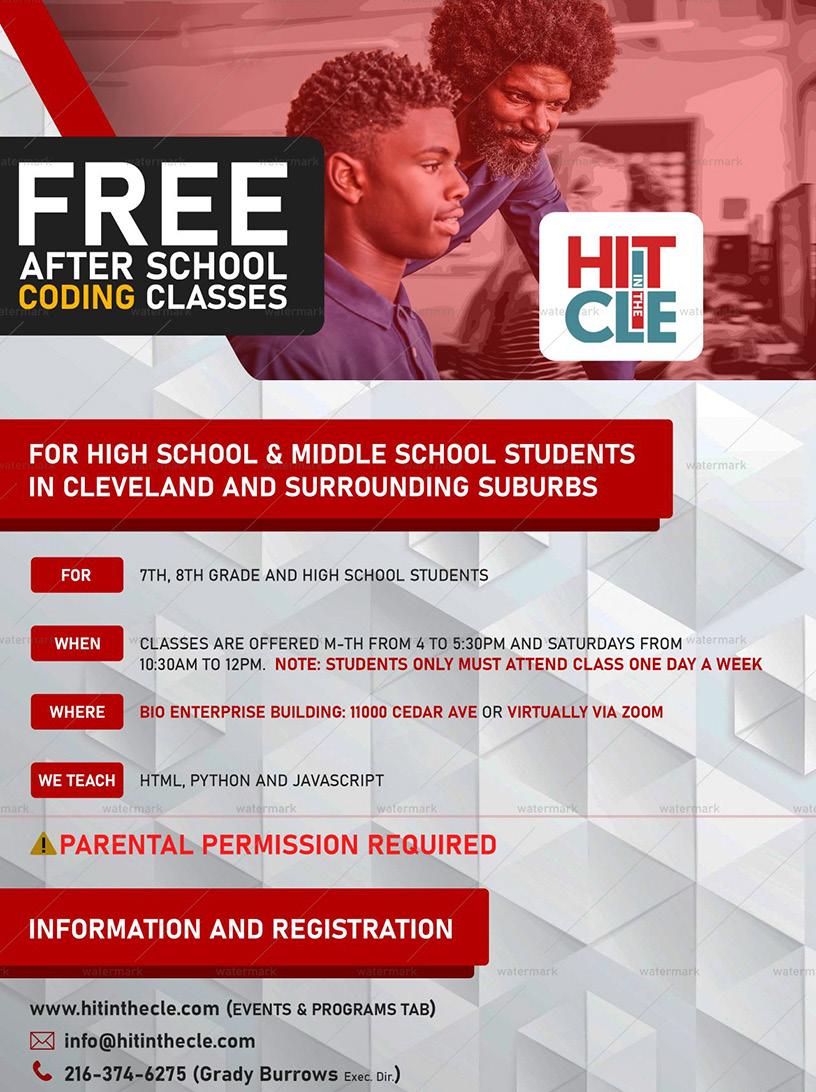
Sponsored by:

The African American History Challenge (AAHC) is the intellectual property of 100 Black Men of America, Inc. The program was started in 1995 under the leadership of the late Brace B. Godfrey, Jr., founding chapter president of 100 Black Men of Metro Baton Rouge, Inc. and a former member of the Board of Directors of 100 Black Men of America, Inc.
The AAHC Competition essentially is an educational and scholarship program designed to enhance the study of African American history. It is an education and scholarship program designed to enhance and/or ignite the study of African American history among youth and increase their interest in knowing and better understanding the legacy left for them by our African American ancestors.
Yet, the competitive spirit is developed within an experience that will engender mutual respect and admiration among the competitors. The National AAHC Championship Competition will take place at the Annual Conference each year.
During the AAHC program, the two (2) students who demonstrated the greatest proficiency were asked to represent their chapters during the National Competition at the Annual Conference. Twenty teams competed in the preliminary rounds to advance towards the Final Competition. These teams were derived of seven (7) Junior Division teams and 13 Senior Division teams. Only the final four (4) Junior and Senior Division teams from the Preliminary Rounds advanced to compete for 3 over $8,000 in scholarships, prizes, and a chance to hold the title, African American History Challenge Competition Champions.

Sponsored by:

In collaboration with State Farm Insurance, the 100 will continue to establish and implement a national program to address and help eradicate financial illiteracy among youth of color.
The Dollars and $ense Youth Investment program (Dollars and $ense) is a financial literacy program sponsored by State Farm. This program was designed to provide high school students, grades 9 through 12, with the opportunity to learn and apply best practice strategies for saving and investing.
The goal of this program was to help students understand basic savings/investment principles and to apply these standards in their day-to-day lives.
